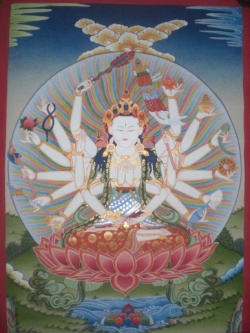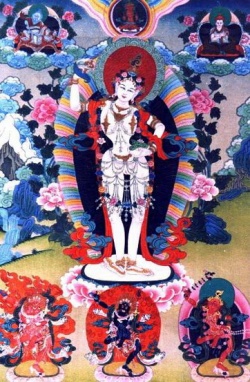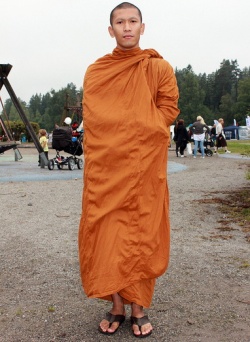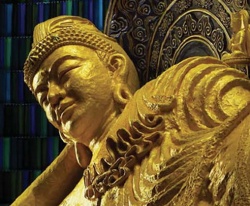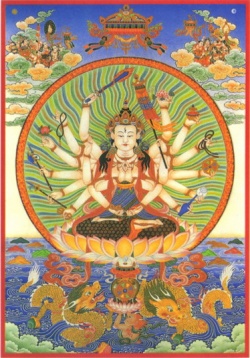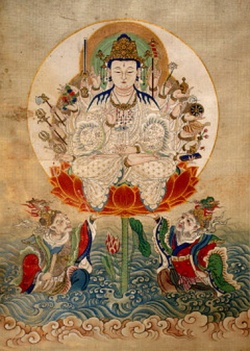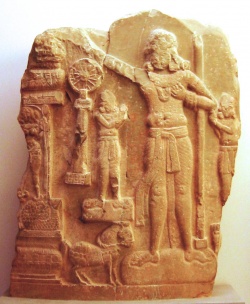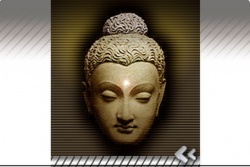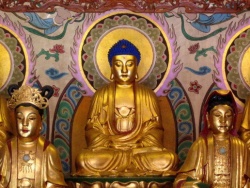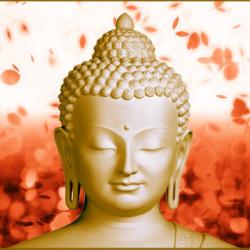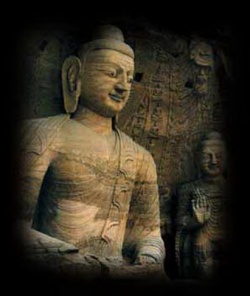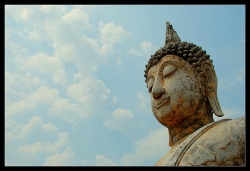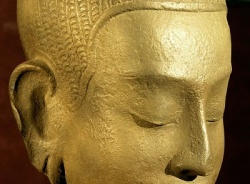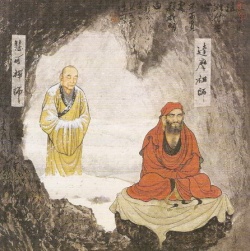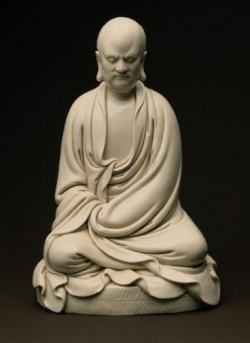Difference between revisions of "The Six Perfections by Lama Zopa Rinpoche"
m (Text replacement - "]]]" to "]])") |
|||
| (5 intermediate revisions by 3 users not shown) | |||
| Line 1: | Line 1: | ||
| − | [[File:Chundi21by31t4439.jpg|thumb|250px|]] | + | [[File:Chundi21by31t4439.jpg|thumb|250px|]] {{DisplayImages|3652|3771|1595|926|105|1660|2191|3645|547|244}} |
<poem> | <poem> | ||
The [[Six Perfections]] by [[Lama Zopa Rinpoche's]] | The [[Six Perfections]] by [[Lama Zopa Rinpoche's]] | ||
| Line 10: | Line 10: | ||
The [[six perfections]] ([[paramitas]]) are: [[generosity]], [[ethics]], [[patience]], {{Wiki|enthusiastic}} perseverance, [[concentration]] and [[wisdom]]. For each [[perfection]] we will be looking at its meaning, the method of following it, its divisions and what should be done in the practice of that [[perfection]].] | The [[six perfections]] ([[paramitas]]) are: [[generosity]], [[ethics]], [[patience]], {{Wiki|enthusiastic}} perseverance, [[concentration]] and [[wisdom]]. For each [[perfection]] we will be looking at its meaning, the method of following it, its divisions and what should be done in the practice of that [[perfection]].] | ||
| − | Even though we try to [[meditate]] on teachings such as the development [[path]] of the [[Highest Yoga Tantra]], the [[Madhyamaka]], the [[Mahamudra]] and [[Kundalini]] [[Yoga]], with the expectation of reaching [[enlightenment]], if we do this without [[bodhicitta]], we cannot pass through the door of the [[Mahayana]] [[path]], let alone get closer to that supreme and perfect goal. Therefore, [[bodhicitta]] should be the main point in the practice of all practitioners, those who [[thirst]] for the most supreme [[happiness]]. After numberless eons of observation, even the [[Buddha's]] [[omniscient]] {{Wiki|holy}} [[mind]] could not find any door of entry to the [[Path]] nor any special method other than [[bodhicitta]]. | + | Even though we try to [[meditate]] on teachings such as the [[development]] [[path]] of the [[Highest Yoga Tantra]], the [[Madhyamaka]], the [[Mahamudra]] and [[Kundalini]] [[Yoga]], with the expectation of reaching [[enlightenment]], if we do this without [[bodhicitta]], we cannot pass through the door of the [[Mahayana]] [[path]], let alone get closer to that supreme and {{Wiki|perfect}} goal. Therefore, [[bodhicitta]] should be the main point in the practice of all practitioners, those who [[thirst]] for the most supreme [[happiness]]. After numberless [[eons]] of observation, even the [[Buddha's]] [[omniscient]] {{Wiki|holy}} [[mind]] could not find any door of entry to the [[Path]] nor any special method other than [[bodhicitta]]. |
When we take the [[Bodhicitta]] [[vows]], with [[prayers]], in the presence of a {{Wiki|holy}} [[object]], we receive the [[bodhicitta]] [[ordination]] that was not received before and we are able to keep it without letting it degenerate. But merely receiving the [[Bodhicitta]] [[vows]] is not enough; they must be put into [[action]], just as merely having the will to go to some country and save [[living beings]] [[suffering]] there from some epidemic {{Wiki|disease}} is not enough—it is necessary to act by going there with the required equipment. | When we take the [[Bodhicitta]] [[vows]], with [[prayers]], in the presence of a {{Wiki|holy}} [[object]], we receive the [[bodhicitta]] [[ordination]] that was not received before and we are able to keep it without letting it degenerate. But merely receiving the [[Bodhicitta]] [[vows]] is not enough; they must be put into [[action]], just as merely having the will to go to some country and save [[living beings]] [[suffering]] there from some epidemic {{Wiki|disease}} is not enough—it is necessary to act by going there with the required equipment. | ||
| − | Therefore, to [[benefit]] the innumerable, different, [[suffering]] [[living beings]] through being [[enlightened]], it is necessary to achieve the [[two kayas]]: the [[rupakaya]] and the [[dharmakaya]]. To achieve these two results, it is necessary to follow the inseparable [[path]] of method and [[wisdom]]. All the [[buddhas]]' [[deeds]] are included in method and [[wisdom]]. The first five [[perfections]] are the method and the last [[perfection]], penetrative [[insight]], is the [[wisdom]]. | + | Therefore, to [[benefit]] the {{Wiki|innumerable}}, different, [[suffering]] [[living beings]] through being [[enlightened]], it is necessary to achieve the [[two kayas]]: the [[rupakaya]] and the [[dharmakaya]]. To achieve these two results, it is necessary to follow the [[inseparable]] [[path]] of method and [[wisdom]]. All the [[buddhas]]' [[deeds]] are included in method and [[wisdom]]. The first five [[perfections]] are the method and the last [[perfection]], penetrative [[insight]], is the [[wisdom]]. |
| − | How to follow the {{Wiki|Holy}} [[Bodhisattva's]] [[deeds]] has three divisions. Firstly, we should follow the general [[deeds]] of the [[bodhisattva]], which entails ripening our [[mind]] through the practice of the [[six perfections]] and ripening the [[minds]] of others through the practices of the four ways of [[gathering]] [[disciples]]. Then we should especially follow the last two [[perfections]], [[concentration]] and [[wisdom]], and finally follow the [[Vajrayana]] [[path]]. | + | How to follow the {{Wiki|Holy}} [[Bodhisattva's]] [[deeds]] has three divisions. Firstly, we should follow the general [[deeds]] of the [[bodhisattva]], which entails ripening our [[mind]] through the practice of the [[six perfections]] and ripening the [[minds]] of others through the practices of the [[four ways]] of [[gathering]] [[disciples]]. Then we should especially follow the last two [[perfections]], [[concentration]] and [[wisdom]], and finally follow the [[Vajrayana]] [[path]]. |
| Line 32: | Line 32: | ||
To be able to be truly generous, we should do the [[meditation]] on the shortcomings of [[miserliness]] and [[greed]], [[thinking]] how the [[body]] and possessions are [[trivial]] and betray those who seek to gain [[peace]]. We should cut [[attachment]] to our [[body]] by [[seeing]] it as [[illusory]], a [[magic]] creation or a [[dream]], and by [[thinking]] that it is dirty, a collection of [[impurities]]. | To be able to be truly generous, we should do the [[meditation]] on the shortcomings of [[miserliness]] and [[greed]], [[thinking]] how the [[body]] and possessions are [[trivial]] and betray those who seek to gain [[peace]]. We should cut [[attachment]] to our [[body]] by [[seeing]] it as [[illusory]], a [[magic]] creation or a [[dream]], and by [[thinking]] that it is dirty, a collection of [[impurities]]. | ||
| − | We should think like this: "I am [[foolish]] not to train my [[thought]] in the way that brings countless and [[boundless]] successes to myself and others—dedicating the [[body]], that which is [[trivial]] and has to be left, no matter how much good care I take of it." By [[thinking]] in this way we should try to arouse the [[thought]] of giving to others as much as possible. | + | We should think like this: "I am [[foolish]] not to train my [[thought]] in the way that brings countless and [[boundless]] successes to myself and others—dedicating the [[body]], that which is [[trivial]] and has to be left, no {{Wiki|matter}} how much good care I take of it." By [[thinking]] in this way we should try to arouse the [[thought]] of giving to others as much as possible. |
We should also remember [[Shantideva's]] words: | We should also remember [[Shantideva's]] words: | ||
| Line 42: | Line 42: | ||
In the teachings known as The Jewelled Rosary, the [[great master]] [[Nagarjuna]] said: | In the teachings known as The Jewelled Rosary, the [[great master]] [[Nagarjuna]] said: | ||
| − | If all the [[merits]] received from saying [[prayers]] such as the dedicating [[prayer]] became matter, they could not fit into even the number of [[universes]] {{Wiki|equal}} to the number of grains of sand in the [[Ganges]]. This was said by [[Guru]] [[Shakyamuni]] and can also be [[realized]] [[logically]]: the [[world]] of [[sentient beings]] is [[infinite]] and so the benefits of the wish are that much. | + | If all the [[merits]] received from saying [[prayers]] such as the dedicating [[prayer]] became {{Wiki|matter}}, they could not fit into even the number of [[universes]] {{Wiki|equal}} to the number of grains of sand in the [[Ganges]]. This was said by [[Guru]] [[Shakyamuni]] and can also be [[realized]] [[logically]]: the [[world]] of [[sentient beings]] is [[infinite]] and so the benefits of the wish are that much. |
After we have [[thought]] much about the benefits of giving and the shortcomings of keeping, and of the [[bodhisattva's]] {{Wiki|holy}} [[actions]] of practicing [[generosity]], the [[thought]] of giving can arise spontaneously in us. Whoever destroys the [[craving]] for possessions and trains in the [[thought]] of giving to others is called a [[bodhisattva]]. | After we have [[thought]] much about the benefits of giving and the shortcomings of keeping, and of the [[bodhisattva's]] {{Wiki|holy}} [[actions]] of practicing [[generosity]], the [[thought]] of giving can arise spontaneously in us. Whoever destroys the [[craving]] for possessions and trains in the [[thought]] of giving to others is called a [[bodhisattva]]. | ||
| Line 74: | Line 74: | ||
the {{Wiki|holy}} [[subject]], which is the [[bodhicitta]] [[motivation]]; | the {{Wiki|holy}} [[subject]], which is the [[bodhicitta]] [[motivation]]; | ||
the {{Wiki|holy}} possession, which is holding that [[bodhicitta]] [[motivation]], not only when being generous with normal possessions but with special [[objects]] as well; | the {{Wiki|holy}} possession, which is holding that [[bodhicitta]] [[motivation]], not only when being generous with normal possessions but with special [[objects]] as well; | ||
| − | the {{Wiki|holy}} purpose, which is the wish to give temporary [[happiness]] to [[sentient beings]] in order to lead them to the [[Wikipedia:Absolute (philosophy)|ultimate]] goal; | + | the {{Wiki|holy}} {{Wiki|purpose}}, which is the wish to give temporary [[happiness]] to [[sentient beings]] in order to lead them to the [[Wikipedia:Absolute (philosophy)|ultimate]] goal; |
the {{Wiki|holy}} skill, which is [[wisdom]] [[realizing]] [[emptiness]]; | the {{Wiki|holy}} skill, which is [[wisdom]] [[realizing]] [[emptiness]]; | ||
the {{Wiki|holy}} [[dedication]], which is always dedicating the [[merits]] of [[generosity]] for the [[achievement]] of [[enlightenment]]; and | the {{Wiki|holy}} [[dedication]], which is always dedicating the [[merits]] of [[generosity]] for the [[achievement]] of [[enlightenment]]; and | ||
| Line 86: | Line 86: | ||
increasing: dedicating the [[merits]] of it to all [[sentient beings]], {{Wiki|equal}} to the sky, for their [[achievement]] of [[enlightenment]]. We must not be dismayed, [[thinking]] that if all is dedicated to [[sentient beings]] there is [[nothing]] left for me—it is a [[mental]] [[dedication]], so there is [[nothing]] wrong with it. On the other hand, we cannot think that there is no point in dedicating [[mentally]] since there is [[nothing]] to receive. | increasing: dedicating the [[merits]] of it to all [[sentient beings]], {{Wiki|equal}} to the sky, for their [[achievement]] of [[enlightenment]]. We must not be dismayed, [[thinking]] that if all is dedicated to [[sentient beings]] there is [[nothing]] left for me—it is a [[mental]] [[dedication]], so there is [[nothing]] wrong with it. On the other hand, we cannot think that there is no point in dedicating [[mentally]] since there is [[nothing]] to receive. | ||
| − | The way to complete the [[perfection]] of [[generosity]] is to complete the training in the [[thought]] of giving even the [[merits]] of [[virtuous]] [[actions]], let alone abolishing [[miserliness]] in our possessions. Completing the practice of the [[perfection]] of [[generosity]] means neither completely eradicating starvation and [[thirst]], nor satisfying the last {{Wiki|beggar}}. If it did, then all the past [[buddhas]] such as [[Guru]] [[Shakyamuni]] would have yet to complete the practice of [[generosity]], having reached [[enlightenment]] by mistake. | + | The way to complete the [[perfection]] of [[generosity]] is to complete the training in the [[thought]] of giving even the [[merits]] of [[virtuous]] [[actions]], let alone abolishing [[miserliness]] in our possessions. Completing the practice of the [[perfection]] of [[generosity]] means neither completely eradicating starvation and [[thirst]], nor satisfying the last {{Wiki|beggar}}. If it did, then all the {{Wiki|past}} [[buddhas]] such as [[Guru]] [[Shakyamuni]] would have yet to complete the practice of [[generosity]], having reached [[enlightenment]] by mistake. |
| − | Those who have renounced the [[worldly]] [[life]] and are living in [[ordination]] should not put [[effort]] into collecting materials with which to be generous if this interrupts [[meditation]], [[listening to teachings]] and leading a [[virtuous]] [[life]]. In this case, practicing material [[generosity]] is not so important; but if, due to past [[karma]], a lot of material has been effortlessly received without interrupting [[virtuous]] practices, then material [[generosity]] is needed. | + | Those who have renounced the [[worldly]] [[life]] and are living in [[ordination]] should not put [[effort]] into collecting materials with which to be generous if this interrupts [[meditation]], [[listening to teachings]] and leading a [[virtuous]] [[life]]. In this case, practicing material [[generosity]] is not so important; but if, due to {{Wiki|past}} [[karma]], a lot of material has been effortlessly received without interrupting [[virtuous]] practices, then material [[generosity]] is needed. |
The Divisions of [[Generosity]] | The Divisions of [[Generosity]] | ||
| Line 106: | Line 106: | ||
the necessity: We should think of the necessity: "Due to this [[action]] I shall complete the [[perfection]] of [[generosity]], becoming fully [[enlightened]]." | the necessity: We should think of the necessity: "Due to this [[action]] I shall complete the [[perfection]] of [[generosity]], becoming fully [[enlightened]]." | ||
the possessions: We should regard possessions in this way: as the [[bodhisattvas]] have dedicated everything to [[sentient beings]] and consider that all things are the possessions of others, we should think that anything with which we practice [[generosity]] is the property of others, and so should [[feel]] as we do when returning to its rightful [[owner]] something that we were given for safe-keeping. | the possessions: We should regard possessions in this way: as the [[bodhisattvas]] have dedicated everything to [[sentient beings]] and consider that all things are the possessions of others, we should think that anything with which we practice [[generosity]] is the property of others, and so should [[feel]] as we do when returning to its rightful [[owner]] something that we were given for safe-keeping. | ||
| − | the [[object]]: We should consider that the being to whom we are being generous is our [[guru]], helping us to complete the [[perfection]] of [[generosity]]. If the [[object]] of our [[generosity]] is an enemy, we should be generous with a [[loving]] [[thought]]. If the [[object]] is [[suffering]] and [[miserable]], we should be generous with [[compassion]]. If the [[object]] is [[knowledgeable]], we should be generous with a [[rejoicing]] [[mind]]. If the [[object]] is a [[friend]], a temporal helper, we should be generous with the [[thought]] of [[equanimity]]. | + | the [[object]]: We should consider that the being to whom we are being generous is our [[guru]], helping us to complete the [[perfection]] of [[generosity]]. If the [[object]] of our [[generosity]] is an enemy, we should be generous with a [[loving]] [[thought]]. If the [[object]] is [[suffering]] and [[miserable]], we should be generous with [[compassion]]. If the [[object]] is [[knowledgeable]], we should be generous with a [[rejoicing]] [[mind]]. If the [[object]] is a [[friend]], a {{Wiki|temporal}} helper, we should be generous with the [[thought]] of [[equanimity]]. |
What Should be Done in the Practice of [[Generosity]]? | What Should be Done in the Practice of [[Generosity]]? | ||
| Line 117: | Line 117: | ||
discouragement: we should not be discouraged by the difficult, extensive [[generosity]] of the [[bodhisattva]]. Before practicing [[generosity]] the [[mind]] should be [[happy]]; while being generous it should be [[calm]]; and afterwards, we should not [[regret]] having been generous. | discouragement: we should not be discouraged by the difficult, extensive [[generosity]] of the [[bodhisattva]]. Before practicing [[generosity]] the [[mind]] should be [[happy]]; while being generous it should be [[calm]]; and afterwards, we should not [[regret]] having been generous. | ||
partiality: We should not have the partial [[thought]], but practice [[generosity]] with impartial [[compassion]] for both enemy and stranger. | partiality: We should not have the partial [[thought]], but practice [[generosity]] with impartial [[compassion]] for both enemy and stranger. | ||
| − | self-interest: Without the slightest [[thought]] of reward for ourselves, we should think that the [[object]] of our [[generosity]] is completely devoid of [[happiness]] and has no ability to remove [[suffering]]. "Without [[thought]] of reward" means that we must not think only of the results of [[generosity]], such as receiving the perfect [[human]] [[rebirth]] or perfect possessions in future lifetimes, but that we should remember that possessions are [[trivial]], and think of the benefits of [[enlightenment]] which are received by practicing [[generosity]]. | + | self-interest: Without the slightest [[thought]] of reward for ourselves, we should think that the [[object]] of our [[generosity]] is completely devoid of [[happiness]] and has no ability to remove [[suffering]]. "Without [[thought]] of reward" means that we must not think only of the results of [[generosity]], such as receiving the {{Wiki|perfect}} [[human]] [[rebirth]] or {{Wiki|perfect}} possessions in {{Wiki|future}} lifetimes, but that we should remember that possessions are [[trivial]], and think of the benefits of [[enlightenment]] which are received by practicing [[generosity]]. |
| − | {{Wiki|fear}}: At the [[time]] of practicing [[generosity]], we should not [[feel]] afraid of becoming poor in the future, nor have treacherous [[thoughts]] of betraying the [[object]] of [[generosity]]. | + | {{Wiki|fear}}: At the [[time]] of practicing [[generosity]], we should not [[feel]] afraid of becoming poor in the {{Wiki|future}}, nor have treacherous [[thoughts]] of betraying the [[object]] of [[generosity]]. |
maliciousness: if we {{Wiki|perceive}} that the [[object]] of our [[generosity]] has certain faults, we should not have the malicious [[thought]] to announce what we have seen. | maliciousness: if we {{Wiki|perceive}} that the [[object]] of our [[generosity]] has certain faults, we should not have the malicious [[thought]] to announce what we have seen. | ||
[[File:C6a16ec.jpg|thumb|250px|]] | [[File:C6a16ec.jpg|thumb|250px|]] | ||
| Line 125: | Line 125: | ||
We should not give small amounts or {{Wiki|inferior}} articles, justifying such [[actions]] by reminding the other how much we gave before or how generous we are. | We should not give small amounts or {{Wiki|inferior}} articles, justifying such [[actions]] by reminding the other how much we gave before or how generous we are. | ||
| − | We should not practice [[generosity]] by compelling the other [[person]] to perform [[non-virtuous]] [[actions]] such as killing or destroying, or to carry out very hard work such as that usually done by [[animals]]. | + | We should not practice [[generosity]] by compelling the other [[person]] to perform [[non-virtuous]] [[actions]] such as {{Wiki|killing}} or destroying, or to carry out very hard work such as that usually done by [[animals]]. |
We should not practice with partiality. If we became a [[king]] we could not deprive one family of their son or daughter and practice [[generosity]] to the child to another. | We should not practice with partiality. If we became a [[king]] we could not deprive one family of their son or daughter and practice [[generosity]] to the child to another. | ||
We should not practice [[generosity]] with materials taken by force from our [[parents]] or servants. | We should not practice [[generosity]] with materials taken by force from our [[parents]] or servants. | ||
| Line 153: | Line 153: | ||
5. Which materials are appropriate in the practice of [[generosity]] and which are not. | 5. Which materials are appropriate in the practice of [[generosity]] and which are not. | ||
| − | We should give whatever material brings the future [[benefit]] of following the [[virtuous]] [[path]]. But, if the material brings harm in the future it should not be given, even though it might result in temporal [[pleasure]]. | + | We should give whatever material brings the {{Wiki|future}} [[benefit]] of following the [[virtuous]] [[path]]. But, if the material brings harm in the {{Wiki|future}} it should not be given, even though it might result in {{Wiki|temporal}} [[pleasure]]. |
| − | If the [[body]] is begged for and the [[time]] is not right, it should not be given; i.e., before we have highly developed [[great compassion]] that prevents the difficulties of giving the [[body]] causing us to [[feel]] upset. Or, if it is more beneficial for [[sentient beings]] that the [[body]] [[exists]], then despite its being begged for, even a part of the [[body]] should not be given. We cannot practice the [[generosity]] of the [[body]] to the wrong [[object]]. It cannot be given to be killed or to be used for some other [[non-virtuous]] purpose, causing us harm. Neither can the [[body]] be given for killing another. Nor can we give it to those whose [[thoughts]] are [[evil]] because they are crazy or possessed by [[spirits]]. To give the [[body]] to such [[objects]] breaks the [[bodhisattva's]] [[precepts]]. | + | If the [[body]] is begged for and the [[time]] is not right, it should not be given; i.e., before we have highly developed [[great compassion]] that prevents the difficulties of giving the [[body]] causing us to [[feel]] upset. Or, if it is more beneficial for [[sentient beings]] that the [[body]] [[exists]], then despite its being begged for, even a part of the [[body]] should not be given. We cannot practice the [[generosity]] of the [[body]] to the wrong [[object]]. It cannot be given to be killed or to be used for some other [[non-virtuous]] {{Wiki|purpose}}, causing us harm. Neither can the [[body]] be given for {{Wiki|killing}} another. Nor can we give it to those whose [[thoughts]] are [[evil]] because they are crazy or possessed by [[spirits]]. To give the [[body]] to such [[objects]] breaks the [[bodhisattva's]] [[precepts]]. |
The possessions not to be given are as follows: | The possessions not to be given are as follows: | ||
| Line 171: | Line 171: | ||
reluctance to practice due to [[miserliness]]. We should think in this way: "It is inevitable that this [[object]] and I shall separate—it will leave me and I shall leave it. Therefore, I make arrangements for [[death]] by taking the [[essence]] from it and making my [[mind]] [[joyful]]." | reluctance to practice due to [[miserliness]]. We should think in this way: "It is inevitable that this [[object]] and I shall separate—it will leave me and I shall leave it. Therefore, I make arrangements for [[death]] by taking the [[essence]] from it and making my [[mind]] [[joyful]]." | ||
| − | not being used to practicing [[generosity]]. We do not want to practice [[generosity]], even though we possess materials because it is not our [[Wikipedia:Habit (psychology)|habit]]. We should realize that not wanting to dedicate to others is the result of having the same [[thought]] in previous lifetimes and that if [[generosity]] is still avoided, we shall be averse to it again in future lifetimes. Therefore, we should not allow ourselves to remain unused to be generous. | + | not being used to practicing [[generosity]]. We do not want to practice [[generosity]], even though we possess materials because it is not our [[Wikipedia:Habit (psychology)|habit]]. We should realize that not wanting to dedicate to others is the result of having the same [[thought]] in previous lifetimes and that if [[generosity]] is still avoided, we shall be averse to it again in {{Wiki|future}} lifetimes. Therefore, we should not allow ourselves to remain unused to be generous. |
not wanting to give because of a lack of material possessions. The remedy for this is to think, ‘‘Since I have [[suffered]] hunger and [[thirst]], and many other unbearable [[samsaric]] [[sufferings]], because [[delusion]] and [[karma]] have prevented me from benefiting others, rather than sending the {{Wiki|beggar}} away empty-handed, it is better to be generous, even should it cost me this [[life]], which itself is the result of benefiting others. I can always [[live]] by eating [[plants]], even though there is not the [[enjoyment]]." Then we should practice [[generosity]], accepting what trouble there might be. | not wanting to give because of a lack of material possessions. The remedy for this is to think, ‘‘Since I have [[suffered]] hunger and [[thirst]], and many other unbearable [[samsaric]] [[sufferings]], because [[delusion]] and [[karma]] have prevented me from benefiting others, rather than sending the {{Wiki|beggar}} away empty-handed, it is better to be generous, even should it cost me this [[life]], which itself is the result of benefiting others. I can always [[live]] by eating [[plants]], even though there is not the [[enjoyment]]." Then we should practice [[generosity]], accepting what trouble there might be. | ||
| − | due to [[attachment]] to beautiful things. When the [[thought]] of giving does not arise due to our [[attachment]] to extremely beautiful things, it is necessary to remember the shortcomings of [[greed]] as quickly as possible, and that the wrong [[belief]], that this [[suffering]] is [[enjoyment]] or [[pleasure]], only brings continual [[suffering]] in the future. | + | due to [[attachment]] to beautiful things. When the [[thought]] of giving does not arise due to our [[attachment]] to extremely beautiful things, it is necessary to remember the shortcomings of [[greed]] as quickly as possible, and that the wrong [[belief]], that this [[suffering]] is [[enjoyment]] or [[pleasure]], only brings continual [[suffering]] in the {{Wiki|future}}. |
The [[generosity]] of the greatly [[wise]] [[bodhisattvas]] is [[mental]] [[generosity]], the [[mental]] [[transformation]] of the extensive and varied enjoyments that [[exist]] into [[infinite]] [[offerings]]. They [[meditate]] truly from the [[heart]], that all are given to [[sentient beings]] with complete, [[pure]] [[bodhicitta]], taking more care of others than ourselves, without difficulty and with such skill that it creates incredible [[merits]] and brings [[endless]] benefits. | The [[generosity]] of the greatly [[wise]] [[bodhisattvas]] is [[mental]] [[generosity]], the [[mental]] [[transformation]] of the extensive and varied enjoyments that [[exist]] into [[infinite]] [[offerings]]. They [[meditate]] truly from the [[heart]], that all are given to [[sentient beings]] with complete, [[pure]] [[bodhicitta]], taking more care of others than ourselves, without difficulty and with such skill that it creates incredible [[merits]] and brings [[endless]] benefits. | ||
| Line 183: | Line 183: | ||
Conclusion | Conclusion | ||
| − | Whoever takes the [[bodhisattva vows]] should understand the importance of following the practice of [[generosity]] as explained, starting immediately, and should pray to be able to follow the hardest practices of [[generosity]] on the higher levels in the future. We should [[feel]] [[pleased]] to practice developing the [[thought]] of giving through being [[detached]] from the [[body]], possessions and [[merits]], and displeased not to train in developing this [[thought]]. We should think that if the practice is abandoned, we are at present creating the negativities of breaking [[precepts]], and in future [[lives]] shall find it extremely difficult to follow the [[bodhisattva's]] [[deeds]]. | + | Whoever takes the [[bodhisattva vows]] should understand the importance of following the practice of [[generosity]] as explained, starting immediately, and should pray to be able to follow the hardest practices of [[generosity]] on the higher levels in the {{Wiki|future}}. We should [[feel]] [[pleased]] to practice developing the [[thought]] of giving through being [[detached]] from the [[body]], possessions and [[merits]], and displeased not to train in developing this [[thought]]. We should think that if the practice is abandoned, we are at {{Wiki|present}} creating the negativities of breaking [[precepts]], and in {{Wiki|future}} [[lives]] shall find it extremely difficult to follow the [[bodhisattva's]] [[deeds]]. |
2. [[Ethics]] | 2. [[Ethics]] | ||
| Line 189: | Line 189: | ||
The Meaning of [[Ethics]] | The Meaning of [[Ethics]] | ||
| − | [[Ethics]] means giving up the [[thought]] of committing [[actions]] of [[body]], [[speech]] and [[mind]] that are harmful to [[sentient beings]]. Completing the practice of [[ethics]] does not mean making all other [[sentient beings]] devoid of harmfulness. If it did, then all the previous [[buddhas]] would have yet to complete its practice. What it does mean is completely and progressively giving up the [[thought]] of [[actions]] harmful to [[sentient beings]]. | + | [[Ethics]] means giving up the [[thought]] of committing [[actions]] of [[body]], [[speech]] and [[mind]] that are harmful to [[sentient beings]]. Completing the practice of [[ethics]] does not mean making all other [[sentient beings]] devoid of {{Wiki|harmfulness}}. If it did, then all the previous [[buddhas]] would have yet to complete its practice. What it does mean is completely and progressively giving up the [[thought]] of [[actions]] harmful to [[sentient beings]]. |
The Method of Following [[Ethics]] | The Method of Following [[Ethics]] | ||
| Line 197: | Line 197: | ||
Our generating [[bodhicitta]] and making the [[vow]] to follow the [[bodhisattva's]] [[deeds]] means that we promise to work for all [[sentient beings]], so that they too might attain the ornament of the [[ethics]] to progress to full [[enlightenment]], thereby [[attaining]] the true meaning of [[ethics]]. Before that, we must develop the strength to keep our own [[precepts]] of [[ethics]] [[pure]]. | Our generating [[bodhicitta]] and making the [[vow]] to follow the [[bodhisattva's]] [[deeds]] means that we promise to work for all [[sentient beings]], so that they too might attain the ornament of the [[ethics]] to progress to full [[enlightenment]], thereby [[attaining]] the true meaning of [[ethics]]. Before that, we must develop the strength to keep our own [[precepts]] of [[ethics]] [[pure]]. | ||
| − | If these degenerate and become impure we fall into the [[lower realms]] and cannot even fulfill our own purpose, let alone that of others. Therefore, those who take the [[precepts]], attempting to bring others' [[success]] by leading them to [[enlightenment]], need to keep an extremely tight [[grip]] lest their [[precepts]] get lost, vigilantly protecting [[body]], [[speech]] and [[mind]] from [[non-virtue]]. | + | If these degenerate and become impure we fall into the [[lower realms]] and cannot even fulfill our own {{Wiki|purpose}}, let alone that of others. Therefore, those who take the [[precepts]], attempting to bring others' [[success]] by leading them to [[enlightenment]], need to keep an extremely tight [[grip]] lest their [[precepts]] get lost, vigilantly protecting [[body]], [[speech]] and [[mind]] from [[non-virtue]]. |
[[File:Budgfj4.jpg|thumb|250px|]] | [[File:Budgfj4.jpg|thumb|250px|]] | ||
| − | Keeping the [[precepts]] purely depends on adhering to the points of practice and avoidance as they were explained. This follows the strong wish and {{Wiki|enthusiastic}} [[determination]] to keep the [[precepts]], which arise from the [[understanding]] achieved through [[meditating]] long on the benefits of keeping [[precepts]] and the shortcomings of not. It is [[vital]] to be aware of the dangers, the [[suffering]] results, of breaking or not keeping [[precepts]], and also to understand the need to avoid the smallest and lightest negativities, the [[actions]] which the [[Enlightened Being]] has said are to be avoided. | + | Keeping the [[precepts]] purely depends on adhering to the points of practice and avoidance as they were explained. This follows the strong wish and {{Wiki|enthusiastic}} [[determination]] to keep the [[precepts]], which arise from the [[understanding]] achieved through [[meditating]] long on the benefits of keeping [[precepts]] and the shortcomings of not. It is [[vital]] to be {{Wiki|aware}} of the dangers, the [[suffering]] results, of breaking or not keeping [[precepts]], and also to understand the need to avoid the smallest and lightest negativities, the [[actions]] which the [[Enlightened Being]] has said are to be avoided. |
| − | Those who | + | Those who observe the [[precepts]] of practicing the [[perfection]] of [[ethics]] [[benefit]] by the [[gradual]] {{Wiki|transcendence}} of their [[mind]]. The level of the [[precepts]] in their [[mind]] develops to the same level as those of the [[great bodhisattvas]] and they receive purely the [[transcendent wisdom]] which has completely removed even the [[seeds]] of all negativities. |
| − | If [[worldly]], external ornaments are worn by the aged it looks absurd but no matter who wears the ornaments of [[ethics]], all other [[living beings]] are [[pleased]]. The {{Wiki|smell}} of [[ethics]] is the best perfume, the sweetest of scents to apply. [[Ethics]] is the coolest lotion to alleviate the [[suffering]] of delusion's heat. | + | If [[worldly]], external ornaments are worn by the aged it looks absurd but no {{Wiki|matter}} who wears the ornaments of [[ethics]], all other [[living beings]] are [[pleased]]. The {{Wiki|smell}} of [[ethics]] is the best [[perfume]], the sweetest of {{Wiki|scents}} to apply. [[Ethics]] is the coolest lotion to alleviate the [[suffering]] of delusion's heat. |
| − | If we | + | If we observe [[precepts]] correctly all enjoyments are received spontaneously, without our having to make efforts to obtain them. Other [[living beings]] can be controlled automatically, without the necessity of threats or {{Wiki|violence}}, and even though they have never received any help from the [[practitioner]], they naturally [[love]] whoever [[lives]] in the [[perfection]] of [[ethics]]. |
In his [[teaching]], [[Guru]] [[Shakyamuni]] said: | In his [[teaching]], [[Guru]] [[Shakyamuni]] said: | ||
| Line 213: | Line 213: | ||
[[Gods]] and men {{Wiki|touch}} their heads to the footprints of the [[moral]] [[person]] with great [[respect]]. | [[Gods]] and men {{Wiki|touch}} their heads to the footprints of the [[moral]] [[person]] with great [[respect]]. | ||
| − | The [[reason]] for observing the [[perfection]] of [[ethics]] should be to lead all [[sentient beings]] into that [[perfection]]. We should destroy the [[thought]] that wishes only for release from the dangers of the lower [[suffering]] [[realms]] and expects the temporal [[perfections]] of the [[god]] and [[human]] [[realms]]. | + | The [[reason]] for observing the [[perfection]] of [[ethics]] should be to lead all [[sentient beings]] into that [[perfection]]. We should destroy the [[thought]] that wishes only for [[release]] from the dangers of the lower [[suffering]] [[realms]] and expects the {{Wiki|temporal}} [[perfections]] of the [[god]] and [[human]] [[realms]]. |
The Divisions of [[Ethics]] | The Divisions of [[Ethics]] | ||
| Line 229: | Line 229: | ||
This is the [[ethics]] which concerns all [[virtuous]] [[actions]] of [[body]], [[speech]] and [[mind]], created with the [[thought]] of benefiting others. | This is the [[ethics]] which concerns all [[virtuous]] [[actions]] of [[body]], [[speech]] and [[mind]], created with the [[thought]] of benefiting others. | ||
| − | This includes [[ethics]] such as following the four complete [[bodhisattva's]] [[actions]], fulfilling the purpose of the present and future [[lives]] of [[sentient beings]], with the eleven different [[forms]] of work and without the [[non-virtue]] of corrupting [[precepts]]. Saying that [[precepts]] such as the five, the eight, the thirty-six and the two hundred and fifty-three—the [[pratimoksha]] vows—are only [[Theravadin]] [[vows]], and to avoid their practice by saying that we are following the [[bodhisattva's]] [[vows]], comes from [[understanding]] neither the basic points of the [[bodhisattva's vow]] of [[ethics]] nor the [[bodhisattva's]] training in [[ethics]]. | + | This includes [[ethics]] such as following the four complete [[bodhisattva's]] [[actions]], fulfilling the {{Wiki|purpose}} of the {{Wiki|present}} and {{Wiki|future}} [[lives]] of [[sentient beings]], with the eleven different [[forms]] of work and without the [[non-virtue]] of corrupting [[precepts]]. Saying that [[precepts]] such as the five, the eight, the thirty-six and the two hundred and fifty-three—the [[pratimoksha]] vows—are only [[Theravadin]] [[vows]], and to avoid their practice by saying that we are following the [[bodhisattva's]] [[vows]], comes from [[understanding]] neither the basic points of the [[bodhisattva's vow]] of [[ethics]] nor the [[bodhisattva's]] training in [[ethics]]. |
What Should Be Practiced in the [[Perfection]] of [[Ethics]] | What Should Be Practiced in the [[Perfection]] of [[Ethics]] | ||
| Line 259: | Line 259: | ||
Conclusion | Conclusion | ||
| − | The [[root]] of successfully following [[bodhisattvas]]' [[actions]] such as the practice of the [[perfection]] of [[ethics]] is to increase the [[mind]] of [[bodhicitta]] without {{Wiki|degeneration}}, and following [[ethics]] is the most skilful method to stop causing harm to other [[living beings]]. | + | The [[root]] of successfully following [[bodhisattvas]]' [[actions]] such as the practice of the [[perfection]] of [[ethics]] is to increase the [[mind]] of [[bodhicitta]] without {{Wiki|degeneration}}, and following [[ethics]] is the most [[skilful]] method to stop causing harm to other [[living beings]]. |
| − | It is necessary to constantly remember to abstain from the [[actions]] that are forbidden by the [[vows]] we have taken by [[knowing]] the prohibited [[actions]] as well as possible, and even the practice of the higher levels of [[ethics]] should be the [[object]] of our [[prayers]]. By praying in this way, because of the result similar to the [[cause]], we can complete the [[bodhisattva's]] training. If it is abandoned we continuously collect heavy negativities, making us incapable of following the [[bodhisattva's]] training in future lifetimes. Therefore, we must make the [[effort]], even from now. | + | It is necessary to constantly remember to abstain from the [[actions]] that are forbidden by the [[vows]] we have taken by [[knowing]] the prohibited [[actions]] as well as possible, and even the practice of the higher levels of [[ethics]] should be the [[object]] of our [[prayers]]. By praying in this way, because of the result similar to the [[cause]], we can complete the [[bodhisattva's]] training. If it is abandoned we continuously collect heavy negativities, making us incapable of following the [[bodhisattva's]] training in {{Wiki|future}} lifetimes. Therefore, we must make the [[effort]], even from now. |
[[File:BuddhaTwang.jpg|thumb|250px|]] | [[File:BuddhaTwang.jpg|thumb|250px|]] | ||
3. [[Patience]] | 3. [[Patience]] | ||
| Line 269: | Line 269: | ||
Practicing [[patience]] means having a [[tranquil]] [[mind]] with the antagonist, and [[compassion]] for him. | Practicing [[patience]] means having a [[tranquil]] [[mind]] with the antagonist, and [[compassion]] for him. | ||
| − | The completion of the [[perfection]] of [[patience]] does not depend on the [[cessation]] of [[sentient beings]] causing bother. Rather, it only depends on our fully developing the training of the [[thought]] | + | The completion of the [[perfection]] of [[patience]] does not depend on the [[cessation]] of [[sentient beings]] causing bother. Rather, it only depends on our fully developing the training of the [[thought]] stopping our [[angry]] reactions. |
In the [[teaching]], [[A Guide to the Bodhisattva's Way of Life]], [[Shantideva]] said: | In the [[teaching]], [[A Guide to the Bodhisattva's Way of Life]], [[Shantideva]] said: | ||
| Line 277: | Line 277: | ||
The Method of Following [[Patience]] | The Method of Following [[Patience]] | ||
| − | The overall method is to understand the great number of benefits of [[patience]] and shortcomings of impatience. The patient [[person]] creates the good [[karma]] to have less enemies in this and future lifetimes; he [[dies]] without {{Wiki|worry}}, and is [[reborn]] in upper [[realms]] such as those of the [[gods]]. [[Thinking]] of the benefits of [[patience]], we should try to be patient. | + | The overall method is to understand the great number of benefits of [[patience]] and shortcomings of impatience. The {{Wiki|patient}} [[person]] creates the good [[karma]] to have less enemies in this and {{Wiki|future}} lifetimes; he [[dies]] without {{Wiki|worry}}, and is [[reborn]] in upper [[realms]] such as those of the [[gods]]. [[Thinking]] of the benefits of [[patience]], we should try to be {{Wiki|patient}}. |
| − | Also, by praising [[patience]] we should encourage others to be patient. It guides us from our enemy, [[anger]], which destroys our [[merits]] and those of others, and which makes us abandon working for others when their [[actions]] are harmful. If we continuously practice [[patience]] we shall not lose our [[happiness]] of [[mind]], and besides keeping us [[happy]] during this [[lifetime]], after [[death]] it closes the door to the [[lower realms]], and also brings the [[Wikipedia:Absolute (philosophy)|ultimate]] goal, [[enlightenment]]. Therefore, the present and future lifetimes are always in [[happiness]]. | + | Also, by praising [[patience]] we should encourage others to be {{Wiki|patient}}. It guides us from our enemy, [[anger]], which destroys our [[merits]] and those of others, and which makes us abandon working for others when their [[actions]] are harmful. If we continuously practice [[patience]] we shall not lose our [[happiness]] of [[mind]], and besides keeping us [[happy]] during this [[lifetime]], after [[death]] it closes the door to the [[lower realms]], and also brings the [[Wikipedia:Absolute (philosophy)|ultimate]] goal, [[enlightenment]]. Therefore, the {{Wiki|present}} and {{Wiki|future}} lifetimes are always in [[happiness]]. |
In his teachings, the [[great teacher]], [[Shantideva]] spoke of the shortcomings of [[anger]]: | In his teachings, the [[great teacher]], [[Shantideva]] spoke of the shortcomings of [[anger]]: | ||
| − | One second of [[anger]] can destroy all the entire [[accumulation]] of [[virtue]], such as [[generosity]] and [[offerings]] made to {{Wiki|holy}} [[Beings]], collected over a thousand eons. | + | One second of [[anger]] can destroy all the entire [[accumulation]] of [[virtue]], such as [[generosity]] and [[offerings]] made to {{Wiki|holy}} [[Beings]], collected over a thousand [[eons]]. |
[[File:Buddhasky.jpg|thumb|250px|]] | [[File:Buddhasky.jpg|thumb|250px|]] | ||
| − | [[Anger]] is the worst of the [[non-virtuous]] [[actions]]. If someone who is not a [[bodhisattva]] gets [[angry]] with one who is a [[bodhisattva]] for only one second, then, as [[Shantideva]] said, it destroys the [[merits]] created in a thousand eons. If a [[bodhisattva]] with less powerful realizations gets [[angry]] with a higher [[bodhisattva]], it destroys the [[merits]] created in a hundred eons. | + | [[Anger]] is the worst of the [[non-virtuous]] [[actions]]. If someone who is not a [[bodhisattva]] gets [[angry]] with one who is a [[bodhisattva]] for only one second, then, as [[Shantideva]] said, it destroys the [[merits]] created in a thousand [[eons]]. If a [[bodhisattva]] with less powerful realizations gets [[angry]] with a higher [[bodhisattva]], it destroys the [[merits]] created in a hundred [[eons]]. |
| − | It is necessary to practice [[patience]] before [[anger]] arises as well as when we are [[angry]], by [[thinking]] of its shortcomings. If we do not try to be patient, [[anger]] [[causes]] [[unhappiness]] and conflict for ourselves and others, and can even make us commit {{Wiki|suicide}}. As we practice [[patience]], we find the greater the number of enemies, the more chance there is to practice. Therefore, we should consider each antagonist as a helper for our [[attainment]] of [[enlightenment]] through the practice of [[patience]]. | + | It is necessary to practice [[patience]] before [[anger]] arises as well as when we are [[angry]], by [[thinking]] of its shortcomings. If we do not try to be {{Wiki|patient}}, [[anger]] [[causes]] [[unhappiness]] and conflict for ourselves and others, and can even make us commit {{Wiki|suicide}}. As we practice [[patience]], we find the greater the number of enemies, the more chance there is to practice. Therefore, we should consider each antagonist as a helper for our [[attainment]] of [[enlightenment]] through the practice of [[patience]]. |
The [[great master]], [[Atisha]], always retained a very bad-tempered [[Indian]] assistant, and when asked not to, [[Guru]] [[Atisha]] said: "Through this I have completed the [[perfection]] of [[patience]]." | The [[great master]], [[Atisha]], always retained a very bad-tempered [[Indian]] assistant, and when asked not to, [[Guru]] [[Atisha]] said: "Through this I have completed the [[perfection]] of [[patience]]." | ||
| − | We should remember that even the followers of the [[shravaka]] [[vehicle]], who mainly work to obtain their own [[liberation]] alone, do not get [[angry]] at antagonists, so that to do so is not fitting for we who appear as [[Mahayana]] practitioners. | + | We should remember that even the followers of the [[shravaka]] [[vehicle]], who mainly work to obtain their own [[liberation]] alone, do not get [[angry]] at {{Wiki|antagonists}}, so that to do so is not fitting for we who appear as [[Mahayana]] practitioners. |
| − | Of the temporal life's problems due to [[anger]] and [[jealousy]], the [[great master]], [[Shantideva]] said in his teachings: | + | Of the {{Wiki|temporal}} life's problems due to [[anger]] and [[jealousy]], the [[great master]], [[Shantideva]] said in his teachings: |
| − | Those who hold the [[painful]], jealous [[mind]] lose what [[peace]] there is and do not [[experience]] more: [[happiness]] and gladness will not be theirs. They cannot [[sleep]] and their [[minds]] are agitated and unsteady. Due to [[jealousy]], the servant will kill even the kind [[master]] on whom he depends for material and other help. And even if [[generosity]] is made to the [[angry]] [[person]], he does not remain free of [[hatred]]. All in all, while the [[angry]] [[mind]] remains, none can [[live]] in [[happiness]]. | + | Those who hold the [[painful]], [[jealous]] [[mind]] lose what [[peace]] there is and do not [[experience]] more: [[happiness]] and gladness will not be theirs. They cannot [[sleep]] and their [[minds]] are agitated and unsteady. Due to [[jealousy]], the servant will kill even the kind [[master]] on whom he depends for material and other help. And even if [[generosity]] is made to the [[angry]] [[person]], he does not remain free of [[hatred]]. All in all, while the [[angry]] [[mind]] remains, none can [[live]] in [[happiness]]. |
Also, as [[Guru]] [[Shakyamuni]] said in his teachings: | Also, as [[Guru]] [[Shakyamuni]] said in his teachings: | ||
| Line 305: | Line 305: | ||
a. The [[Patience]] of Having [[Compassion]] for the Enemy | a. The [[Patience]] of Having [[Compassion]] for the Enemy | ||
[[File:Buddhas.jpg|thumb|250px|]] | [[File:Buddhas.jpg|thumb|250px|]] | ||
| − | When living and non-living things become harmful antagonists, we should remember the shortcomings of [[anger]] and try to be patient. | + | When living and non-living things become harmful {{Wiki|antagonists}}, we should remember the shortcomings of [[anger]] and try to be {{Wiki|patient}}. |
| − | Once there was a [[disciple]] who was beating a thief, and no matter how his [[guru]] tried to separate them, he could not. Finally, he wagged his finger under the disciple's {{Wiki|nose}}, saying, "[[Patience]]! [[Patience]]!" Then, remembering [[patience]], the [[disciple]] replied, "What are the benefits of pretending to be patient once the whole [[angry]] episode has ended?" Although the practice of [[patience]] is difficult at first, by training our [[mind]] in the [[thought]] of being patient we get accustomed to it, and then in all situations the [[meditation]] on [[patience]] becomes easier. | + | Once there was a [[disciple]] who was beating a thief, and no {{Wiki|matter}} how his [[guru]] tried to separate them, he could not. Finally, he wagged his finger under the disciple's {{Wiki|nose}}, saying, "[[Patience]]! [[Patience]]!" Then, remembering [[patience]], the [[disciple]] replied, "What are the benefits of pretending to be {{Wiki|patient}} once the whole [[angry]] episode has ended?" Although the practice of [[patience]] is difficult at first, by training our [[mind]] in the [[thought]] of being {{Wiki|patient}} we get accustomed to it, and then in all situations the [[meditation]] on [[patience]] becomes easier. |
| − | There are [[reasons]] showing why we should not get [[angry]] with the enemy. For example, we are hit on the head by a stick wielded by somebody else: instead of being [[angry]] with that [[person]], we should check up like this: "To be [[angry]] with the [[object]] causing me [[pain]] means I should be [[angry]] with the stick. But the stick itself is not responsible for this; it is powerless, under the control of the [[person]] who wields it. In the same way, the [[person]] wielding the stick has no control; he is obliged to do so by his deluded [[mind]]. How can I get [[angry]] with the [[person]]? I cannot. Being struck by the stick was the temporal co-operative [[cause]] of my misbehavior, but the principal [[cause]] of this [[suffering]] result is my past [[karma]], such as harming other beings—it is the fault of such [[karma]]. Therefore, why should I get [[angry]] with the result of [[karma]] created by myself when it ripens on me? I should try to dispel the other person's [[delusion]] without getting [[angry]] with him: he has no control and has become crazy with [[delusion]]. This is the same thing that a father would do if his son became crazy and started to beat him. Instead of fighting with [[anger]], the father would try to cure his son of the disturbance. Likewise, [[doctors]] try to cure their psychotic patients, even though attacked by them." | + | There are [[reasons]] showing why we should not get [[angry]] with the enemy. For example, we are hit on the head by a stick wielded by somebody else: instead of being [[angry]] with that [[person]], we should check up like this: "To be [[angry]] with the [[object]] causing me [[pain]] means I should be [[angry]] with the stick. But the stick itself is not responsible for this; it is powerless, under the control of the [[person]] who wields it. In the same way, the [[person]] wielding the stick has no control; he is obliged to do so by his deluded [[mind]]. How can I get [[angry]] with the [[person]]? I cannot. Being struck by the stick was the {{Wiki|temporal}} co-operative [[cause]] of my misbehavior, but the [[principal]] [[cause]] of this [[suffering]] result is my {{Wiki|past}} [[karma]], such as harming other beings—it is the fault of such [[karma]]. Therefore, why should I get [[angry]] with the result of [[karma]] created by myself when it ripens on me? I should try to dispel the other person's [[delusion]] without getting [[angry]] with him: he has no control and has become crazy with [[delusion]]. This is the same thing that a father would do if his son became crazy and started to beat him. Instead of fighting with [[anger]], the father would try to cure his son of the disturbance. Likewise, [[doctors]] try to cure their psychotic patients, even though attacked by them." |
We should also think like this: "When the [[fire]] burns my hand it is my fault for {{Wiki|touching}} it—I cannot get [[angry]] with the [[fire]]. Just as I cannot get [[angry]] with the [[person]], the external enemy, because it is my own fault that he is obliged to harm me. Just as the [[nature]] of [[fire]] is burning heat and so I do not get [[angry]] with the [[fire]] when it burns me, if the [[nature]] of the [[person]] who is my enemy is to give harm, I cannot get [[angry]] with him, the [[living being]]." | We should also think like this: "When the [[fire]] burns my hand it is my fault for {{Wiki|touching}} it—I cannot get [[angry]] with the [[fire]]. Just as I cannot get [[angry]] with the [[person]], the external enemy, because it is my own fault that he is obliged to harm me. Just as the [[nature]] of [[fire]] is burning heat and so I do not get [[angry]] with the [[fire]] when it burns me, if the [[nature]] of the [[person]] who is my enemy is to give harm, I cannot get [[angry]] with him, the [[living being]]." | ||
| Line 319: | Line 319: | ||
As the [[great master]], [[Shantideva]] said: | As the [[great master]], [[Shantideva]] said: | ||
| − | If I cannot tolerate even this present level of [[suffering]], why don't I get [[angry]] with the [[cause]] of the [[hell]] [[suffering]] and destroy it? | + | If I cannot tolerate even this {{Wiki|present}} level of [[suffering]], why don't I get [[angry]] with the [[cause]] of the [[hell]] [[suffering]] and destroy it? |
b. The [[Patience]] of Voluntarily Bearing [[Suffering]] | b. The [[Patience]] of Voluntarily Bearing [[Suffering]] | ||
| − | When there are difficulties in the [[Dharma]] practice these should be borne, and such things as [[sickness]] and undesirable enemies and even the [[suffering]] in the [[dreams]] should all be made helpful for the [[Dharma]] practice, turning all these problems into treatment by not being [[attached]] to temporal {{Wiki|comfort}}. | + | When there are difficulties in the [[Dharma]] practice these should be borne, and such things as [[sickness]] and undesirable enemies and even the [[suffering]] in the [[dreams]] should all be made helpful for the [[Dharma]] practice, turning all these problems into treatment by not being [[attached]] to {{Wiki|temporal}} {{Wiki|comfort}}. |
| − | While experiencing trouble with enemies or non-living things, we should think that the main [[cause]] of such situations is our own past [[lives]]' [[karma]] and [[delusion]] and it is our own fault that we [[suffer]] them. If this were not true, then those who had escaped from [[delusion]] and [[karma]] would still have enemies, but they do not. We should also try to [[feel]] unbearable [[compassion]] for the enemy, as he is creating extra negative [[karma]] while [[thinking]] that his [[actions]] are the [[cause]] of [[peace]]. | + | While experiencing trouble with enemies or non-living things, we should think that the main [[cause]] of such situations is our own {{Wiki|past}} [[lives]]' [[karma]] and [[delusion]] and it is our own fault that we [[suffer]] them. If this were not true, then those who had escaped from [[delusion]] and [[karma]] would still have enemies, but they do not. We should also try to [[feel]] unbearable [[compassion]] for the enemy, as he is creating extra negative [[karma]] while [[thinking]] that his [[actions]] are the [[cause]] of [[peace]]. |
| − | It is necessary to think about these [[samsaric]] [[sufferings]] that we are experiencing in the way shown in the [[equanimity]] [[meditation]]. We should try to remember and [[feel]] [[pleased]] that through this practice the compulsion for our having to [[experience]] future [[sufferings]] such as those of the [[three lower realms]] is finishing. That is, just as someone who is to be executed does not [[mind]] cutting off his hand to escape from prison, so when we [[experience]] some trouble and difficulty without [[Dharma]] practice, we should [[feel]] that it is good to endure these as it thereby finishes so much [[suffering]] in the [[three lower realms]]. | + | It is necessary to think about these [[samsaric]] [[sufferings]] that we are experiencing in the way shown in the [[equanimity]] [[meditation]]. We should try to remember and [[feel]] [[pleased]] that through this practice the compulsion for our having to [[experience]] {{Wiki|future}} [[sufferings]] such as those of the [[three lower realms]] is finishing. That is, just as someone who is to be executed does not [[mind]] cutting off his hand to escape from {{Wiki|prison}}, so when we [[experience]] some trouble and difficulty without [[Dharma]] practice, we should [[feel]] that it is good to endure these as it thereby finishes so much [[suffering]] in the [[three lower realms]]. |
| − | At such times it is also necessary to remember the [[causes of suffering]]. Remembering our creation of negative [[karma]], we [[feel]] upset, and we lose the [[pride]] with which we think, "I am faultless, I am perfectly good, I am not stupid.'' And this also helps us to see how other [[people]] are [[suffering]] in the same situation, so that [[compassion]] can arise. All in all, it is very helpful because it makes us [[conscious]] and aware, careful to avoid [[negative actions]] and [[happy]] to create [[virtuous]] ones. | + | At such times it is also necessary to remember the [[causes of suffering]]. Remembering our creation of negative [[karma]], we [[feel]] upset, and we lose the [[pride]] with which we think, "I am faultless, I am perfectly good, I am not stupid.'' And this also helps us to see how other [[people]] are [[suffering]] in the same situation, so that [[compassion]] can arise. All in all, it is very helpful because it makes us [[conscious]] and {{Wiki|aware}}, careful to avoid [[negative actions]] and [[happy]] to create [[virtuous]] ones. |
Those with [[ordination]], [[monks and nuns]], voluntarily take on the [[suffering]] of lessening [[desire]], being content with simple [[food]], clothing and place of abode, even if there are difficulties. But the [[person]] who does not [[live]] in that situation, especially [[mentally]], is always concerned with satisfying the [[desire]] that constantly wants more and better. As he always works for that without [[thinking]] of the [[Dharma]], so his [[life]] is wasted. | Those with [[ordination]], [[monks and nuns]], voluntarily take on the [[suffering]] of lessening [[desire]], being content with simple [[food]], clothing and place of abode, even if there are difficulties. But the [[person]] who does not [[live]] in that situation, especially [[mentally]], is always concerned with satisfying the [[desire]] that constantly wants more and better. As he always works for that without [[thinking]] of the [[Dharma]], so his [[life]] is wasted. | ||
| Line 347: | Line 347: | ||
Conclusion | Conclusion | ||
| − | If we are following the [[bodhisattva's]] [[actions]], remembering and [[meditating]] on [[bodhicitta]] are the main factors bringing the [[desire]] to lead all [[sentient beings]] in the [[perfection]] of [[patience]]. To progress we should train by praying to reach even the [[highest]] levels of [[patience]]. Beginners who are fully following the practice of [[patience]] need to confess any downfall of the [[discipline]]. If we give up during our practice of [[patience]], we continually create much negative [[karma]], making the practice of the most [[exalted]] [[bodhisattva's]] [[actions]] in future lifetimes extremely difficult. | + | If we are following the [[bodhisattva's]] [[actions]], remembering and [[meditating]] on [[bodhicitta]] are the main factors bringing the [[desire]] to lead all [[sentient beings]] in the [[perfection]] of [[patience]]. To progress we should train by praying to reach even the [[highest]] levels of [[patience]]. Beginners who are fully following the practice of [[patience]] need to confess any downfall of the [[discipline]]. If we give up during our practice of [[patience]], we continually create much negative [[karma]], making the practice of the most [[exalted]] [[bodhisattva's]] [[actions]] in {{Wiki|future}} lifetimes extremely difficult. |
[[File:Buddha444.jpg|thumb|250px|]] | [[File:Buddha444.jpg|thumb|250px|]] | ||
By considering such practices as the most important aspects of the [[path]], trying to practice what we are capable of practicing and training our [[mind]] in that which we are not, we shall be able to complete the [[perfection]] of [[patience]] with few [[sufferings]] or difficulties. | By considering such practices as the most important aspects of the [[path]], trying to practice what we are capable of practicing and training our [[mind]] in that which we are not, we shall be able to complete the [[perfection]] of [[patience]] with few [[sufferings]] or difficulties. | ||
| Line 359: | Line 359: | ||
The Method of Following {{Wiki|Enthusiastic}} Perseverance | The Method of Following {{Wiki|Enthusiastic}} Perseverance | ||
| − | We should be spontaneously aware of the [[inconceivable]] benefits of practicing {{Wiki|enthusiastic}} perseverance and the shortcomings of not. {{Wiki|Enthusiastic}} perseverance dispels all [[sufferings]]. Its practice is fundamental to the avoidance of [[suffering]] in the [[lower realms]], and through it we receive both [[worldly]] realizations and [[transcendent]], [[supramundane]] realizations, those [[beyond]] the ordinary. Only {{Wiki|enthusiastic}} perseverance can be called the main and best [[cause]] for the complete [[attainment]] of all [[virtue]]. Through perseverance we achieve the most [[sublime]] [[enlightenment]]. | + | We should be spontaneously {{Wiki|aware}} of the [[inconceivable]] benefits of practicing {{Wiki|enthusiastic}} perseverance and the shortcomings of not. {{Wiki|Enthusiastic}} perseverance dispels all [[sufferings]]. Its practice is fundamental to the avoidance of [[suffering]] in the [[lower realms]], and through it we receive both [[worldly]] realizations and [[transcendent]], [[supramundane]] realizations, those [[beyond]] the ordinary. Only {{Wiki|enthusiastic}} perseverance can be called the main and best [[cause]] for the complete [[attainment]] of all [[virtue]]. Through perseverance we achieve the most [[sublime]] [[enlightenment]]. |
As it says in the teachings: | As it says in the teachings: | ||
| Line 375: | Line 375: | ||
[[wisdom]], and does not work for others. | [[wisdom]], and does not work for others. | ||
| − | All in all, if there is no perseverance and we are under the control of [[laziness]], we lose all the white [[actions]], all chances for the [[success]] of temporal work, and cannot fulfill our [[Wikipedia:Absolute (philosophy)|ultimate]] purpose. | + | All in all, if there is no perseverance and we are under the control of [[laziness]], we lose all the white [[actions]], all chances for the [[success]] of {{Wiki|temporal}} work, and cannot fulfill our [[Wikipedia:Absolute (philosophy)|ultimate]] {{Wiki|purpose}}. |
The Divisions of {{Wiki|Enthusiastic}} Perseverance | The Divisions of {{Wiki|Enthusiastic}} Perseverance | ||
| Line 381: | Line 381: | ||
a. Dauntless, Armor-like Perseverance | a. Dauntless, Armor-like Perseverance | ||
| − | When the [[bodhisattva]] practices {{Wiki|enthusiastic}} perseverance, before any [[action]] he dons the [[mental]] armor of the [[pleased]] [[mind]]. This is the [[mind]] that is [[happy]] to try to achieve [[enlightenment]] for the sake of [[extinguishing]] the [[suffering]] of just one [[sentient being]], even if it means having to remain in the [[hell realms]] for a billion times the number of three countless great eons {{Wiki|equal}} to the number of whiles in the number of days in one thousand great eons. | + | When the [[bodhisattva]] practices {{Wiki|enthusiastic}} perseverance, before any [[action]] he dons the [[mental]] armor of the [[pleased]] [[mind]]. This is the [[mind]] that is [[happy]] to try to achieve [[enlightenment]] for the sake of [[extinguishing]] the [[suffering]] of just one [[sentient being]], even if it means having to remain in the [[hell realms]] for a billion times the number of three countless great [[eons]] {{Wiki|equal}} to the number of whiles in the number of days in one thousand great [[eons]]. |
| − | From the [[teaching]], A Guide to a [[Bodhisattva's]] Way of [[Life]]: | + | From the [[teaching]], A [[Guide]] to a [[Bodhisattva's]] Way of [[Life]]: |
| − | Because sinfulness is avoided, there is no [[suffering]]. Because skilful work is done for [[sentient beings]], with [[Wisdom]] in the [[evolution]] of [[karma]], there is no [[unhappiness]]. | + | Because sinfulness is avoided, there is no [[suffering]]. Because [[skilful]] work is done for [[sentient beings]], with [[Wisdom]] in the [[evolution]] of [[karma]], there is no [[unhappiness]]. |
Even if he has to [[suffer]] in the [[hell realm]] of unceasing [[suffering]] for the sake of [[sentient beings]], the [[bodhisattva]] purifies his [[non-virtues]] and has no [[suffering]]. He chooses to go there gladly, as he would to a [[paradise]], and [[feels]] no [[unhappiness]]. | Even if he has to [[suffer]] in the [[hell realm]] of unceasing [[suffering]] for the sake of [[sentient beings]], the [[bodhisattva]] purifies his [[non-virtues]] and has no [[suffering]]. He chooses to go there gladly, as he would to a [[paradise]], and [[feels]] no [[unhappiness]]. | ||
| Line 395: | Line 395: | ||
c. The Perseverance of Working for Other [[Sentient Beings]] | c. The Perseverance of Working for Other [[Sentient Beings]] | ||
| − | [This is the [[mind]] working towards [[perfection]] | + | [This is the [[mind]] working towards [[perfection]]) by such means as following the practice of the {{Wiki|enthusiastic}} perseverance of the total [[actions]] of the [[bodhisattva]]. |
What Should Be Done in the Practice of {{Wiki|Enthusiastic}} Perseverance | What Should Be Done in the Practice of {{Wiki|Enthusiastic}} Perseverance | ||
| − | The practice to actualize {{Wiki|enthusiastic}} perseverance is extremely important—it is the most important thing, because receiving all the white [[dharmas]] and all progress depend on it. To generate {{Wiki|enthusiastic}} perseverance it is first necessary to avoid its opponents. To do this they must be [[recognized]] and then the skilful methods to avoid them followed. | + | The practice to actualize {{Wiki|enthusiastic}} perseverance is extremely important—it is the most important thing, because receiving all the white [[dharmas]] and all progress depend on it. To generate {{Wiki|enthusiastic}} perseverance it is first necessary to avoid its opponents. To do this they must be [[recognized]] and then the [[skilful]] methods to avoid them followed. |
The Three Lazinesses | The Three Lazinesses | ||
| Line 409: | Line 409: | ||
This is the [[laziness]] of putting off our practice by [[thinking]] that there will still be [[time]]. | This is the [[laziness]] of putting off our practice by [[thinking]] that there will still be [[time]]. | ||
| − | The remedy for this is to [[meditate]] strongly, with deep [[feeling]], on the fact that the [[human]] [[rebirth]] we have received decays very quickly and, falling into the [[lower realms]] after [[death]], it is extremely difficult to receive such a perfect [[rebirth]] again. By means of this [[meditation]] we should generate the strong [[concern]] that our [[time]] is so short. | + | The remedy for this is to [[meditate]] strongly, with deep [[feeling]], on the fact that the [[human]] [[rebirth]] we have received decays very quickly and, falling into the [[lower realms]] after [[death]], it is extremely difficult to receive such a {{Wiki|perfect}} [[rebirth]] again. By means of this [[meditation]] we should generate the strong [[concern]] that our [[time]] is so short. |
b. The [[Laziness]] [[Arising]] from [[Attachment]] | b. The [[Laziness]] [[Arising]] from [[Attachment]] | ||
| Line 417: | Line 417: | ||
This results from [[attachment]] to ordinary [[samsaric]] [[pleasures]], those received through the [[objects]] of the [[five senses]] or [[sleep]], and from not having [[aversion]] to [[samsara]]. It could be the [[attachment]] to receiving [[respect]] and materials, to idle chatter, to doing work like {{Wiki|farming}} or business, to traveling, all of which are done for the {{Wiki|comfort}} of this [[life]]. Doing these [[non-virtuous]] [[activities]] and bearing whatever difficulties arise is all [[negative energy]] and is called [[laziness]] from the [[Dharma]] point of [[view]]. | This results from [[attachment]] to ordinary [[samsaric]] [[pleasures]], those received through the [[objects]] of the [[five senses]] or [[sleep]], and from not having [[aversion]] to [[samsara]]. It could be the [[attachment]] to receiving [[respect]] and materials, to idle chatter, to doing work like {{Wiki|farming}} or business, to traveling, all of which are done for the {{Wiki|comfort}} of this [[life]]. Doing these [[non-virtuous]] [[activities]] and bearing whatever difficulties arise is all [[negative energy]] and is called [[laziness]] from the [[Dharma]] point of [[view]]. | ||
| − | The remedy for this is to [[meditate]] on the fact that [[Dharma]] practice is the source of [[infinite]] [[happiness]] in the present and future [[lives]] and the way to {{Wiki|decrease}} [[suffering]]. Meaningless [[actions]] such as unnecessary talk and scattered [[thought]] destroy the great meaningfulness of this [[life]] and [[cause]] innumerable meaningless [[sufferings]] to arise. It is necessary to try to [[feel]] like this: "Why am I [[pleased]] to create the [[cause of suffering]], such as scattered [[thoughts]] and distracting [[actions]], while avoiding the {{Wiki|holy}} [[Dharma]] from which the most supreme [[happiness]] arises?" | + | The remedy for this is to [[meditate]] on the fact that [[Dharma]] practice is the source of [[infinite]] [[happiness]] in the {{Wiki|present}} and {{Wiki|future}} [[lives]] and the way to {{Wiki|decrease}} [[suffering]]. Meaningless [[actions]] such as unnecessary talk and scattered [[thought]] destroy the great meaningfulness of this [[life]] and [[cause]] {{Wiki|innumerable}} meaningless [[sufferings]] to arise. It is necessary to try to [[feel]] like this: "Why am I [[pleased]] to create the [[cause of suffering]], such as scattered [[thoughts]] and distracting [[actions]], while avoiding the {{Wiki|holy}} [[Dharma]] from which the most supreme [[happiness]] arises?" |
c. The [[Laziness]] of Discouragement | c. The [[Laziness]] of Discouragement | ||
| Line 425: | Line 425: | ||
The remedy for this is to think, "[[Lord Buddha]] tells only the [[truth]], makes no mistakes and never lies. So if he says that even flies can reach [[enlightenment]], then for me, being born [[human]] with the capability of observing practice and avoidance, if I don't give up {{Wiki|enthusiastic}} perseverance why should I not achieve [[enlightenment]]?" | The remedy for this is to think, "[[Lord Buddha]] tells only the [[truth]], makes no mistakes and never lies. So if he says that even flies can reach [[enlightenment]], then for me, being born [[human]] with the capability of observing practice and avoidance, if I don't give up {{Wiki|enthusiastic}} perseverance why should I not achieve [[enlightenment]]?" | ||
| − | We should also think, "The past and present [[buddhas]] as well as those who will reach [[enlightenment]] in the future did not achieve the [[path]] by already being [[enlightened]]. So I too must have such perseverance that, even if it takes me my whole [[life]] to realize only the [[meditation]] on the perfect [[human]] [[rebirth]] and the difficulty of finding it, I shall do it, for they all achieved [[enlightenment]] by following such a [[path]], in such a way, with such {{Wiki|enthusiastic}} perseverance." | + | We should also think, "The {{Wiki|past}} and {{Wiki|present}} [[buddhas]] as well as those who will reach [[enlightenment]] in the {{Wiki|future}} did not achieve the [[path]] by already being [[enlightened]]. So I too must have such perseverance that, even if it takes me my whole [[life]] to realize only the [[meditation]] on the {{Wiki|perfect}} [[human]] [[rebirth]] and the difficulty of finding it, I shall do it, for they all achieved [[enlightenment]] by following such a [[path]], in such a way, with such {{Wiki|enthusiastic}} perseverance." |
[[File:Buddha-1fdd.jpg|thumb|250px|]] | [[File:Buddha-1fdd.jpg|thumb|250px|]] | ||
| − | Instead of [[feeling]] discouraged when we think of these high [[bodhisattva's]] practices, such as practicing [[generosity]] of the [[body]] or its parts for the [[attainment]] of [[enlightenment]], we should think as follows: "Not living in the [[bodhisattva's]] [[actions]], I have been circling in [[samsara]], experiencing unspeakable [[sufferings]], such as the [[body]] being chopped and cut and burned, and none of this has helped to accomplish even my own purpose. But [[suffering]], bearing the difficulties for the [[achievement]] of [[enlightenment]] is never the same as the other. Also it is necessary for bringing my own and others' [[success]]. In [[samsara]], the [[body]] can be cut into pieces or burned countless hundreds of millions of times without achieving [[enlightenment]], but when these [[sufferings]] are [[experienced]] for the sake of achieving [[enlightenment]], their number has a limit. This is experiencing temporal discomfort in order to cease those innumerable [[sufferings]], just as patients [[experience]] the discomfort of surgery as [[doctors]] cure them of their illnesses." | + | Instead of [[feeling]] discouraged when we think of these high [[bodhisattva's]] practices, such as practicing [[generosity]] of the [[body]] or its parts for the [[attainment]] of [[enlightenment]], we should think as follows: "Not living in the [[bodhisattva's]] [[actions]], I have been circling in [[samsara]], experiencing unspeakable [[sufferings]], such as the [[body]] being chopped and cut and burned, and none of this has helped to [[accomplish]] even my own {{Wiki|purpose}}. But [[suffering]], bearing the difficulties for the [[achievement]] of [[enlightenment]] is never the same as the other. Also it is necessary for bringing my own and others' [[success]]. In [[samsara]], the [[body]] can be cut into pieces or burned countless hundreds of millions of times without achieving [[enlightenment]], but when these [[sufferings]] are [[experienced]] for the sake of achieving [[enlightenment]], their number has a limit. This is experiencing {{Wiki|temporal}} discomfort in order to cease those {{Wiki|innumerable}} [[sufferings]], just as patients [[experience]] the discomfort of surgery as [[doctors]] cure them of their illnesses." |
When the power of [[great compassion]] is strongly developed, [[generosity]] can be made using the [[body]]. This becomes greatly meaningful, and there are no difficulties [[experienced]] while making such [[generosity]]. | When the power of [[great compassion]] is strongly developed, [[generosity]] can be made using the [[body]]. This becomes greatly meaningful, and there are no difficulties [[experienced]] while making such [[generosity]]. | ||
| Line 435: | Line 435: | ||
At first the [[Lord]] trains us to make [[Charity]] of vegetables and suchlike. By training slowly from this we can eventually dedicate our own flesh. When we consider the [[body]] as we do vegetables, then there is no difficulty in dedicating our flesh. | At first the [[Lord]] trains us to make [[Charity]] of vegetables and suchlike. By training slowly from this we can eventually dedicate our own flesh. When we consider the [[body]] as we do vegetables, then there is no difficulty in dedicating our flesh. | ||
| − | Although it is necessary to completely accumulate [[infinite]] collections of [[merit]] in order to achieve [[enlightenment]], we must not be discouraged by [[thinking]] that it is extremely difficult and that we are incapable of doing so. When we | + | Although it is necessary to completely [[accumulate]] [[infinite]] collections of [[merit]] in order to achieve [[enlightenment]], we must not be discouraged by [[thinking]] that it is extremely difficult and that we are incapable of doing so. When we observe [[vows]] motivated by the [[thought]] of accumulating [[infinite]] [[merit]] in order to achieve the [[infinite]] [[wisdom]] of the [[Buddha]] to [[benefit]] [[infinite]] [[sentient beings]], as long as we observe them correctly—during the [[time]] of [[sleeping]] and being awake, with the distracted and the undistracted mind—there is always the creation of [[merit]] {{Wiki|equal}} to [[infinite space]]. Hence, there are no difficulties in accumulating [[infinite]] [[merit]]. |
| − | It is wonderful to have the [[thought]] of achieving [[enlightenment]] for the sake of [[sentient beings]] in a short [[time]], through the development of extremely great [[love]] and [[compassion]]. But if, when [[seeing]] the necessity for innumerable austere practices and for the following the [[infinite]] practices of the [[bodhisattvas]] for a long [[time]], we get discouraged, [[thinking]] nobody could be capable of that, this indirectly disturbs our [[bodhicitta]] [[motivation]], and directly disturbs our progress towards [[bodhicitta]]. Such [[ideas]] put a great distance between ourselves and [[enlightenment]] because they disturb the wide development of the power of the [[bodhicitta]]. | + | It is wonderful to have the [[thought]] of achieving [[enlightenment]] for the sake of [[sentient beings]] in a short [[time]], through the [[development]] of extremely great [[love]] and [[compassion]]. But if, when [[seeing]] the necessity for {{Wiki|innumerable}} austere practices and for the following the [[infinite]] practices of the [[bodhisattvas]] for a long [[time]], we get discouraged, [[thinking]] nobody could be capable of that, this indirectly disturbs our [[bodhicitta]] [[motivation]], and directly disturbs our progress towards [[bodhicitta]]. Such [[ideas]] put a great distance between ourselves and [[enlightenment]] because they disturb the wide [[development]] of the power of the [[bodhicitta]]. |
[[File:Buddha 2sw.jpg|thumb|250px|]] | [[File:Buddha 2sw.jpg|thumb|250px|]] | ||
| − | If we think that the [[desire]] to follow the [[tantric path]], the short-cut to [[enlightenment]], is a disturbance, the difference between these two [[minds]] is as great as that between [[earth]] and sky. For such [[motivation]] is based on the fundamental [[bodhicitta]] [[thought]]: "For each [[sentient being]] I can [[experience]] [[suffering]] in the [[hell]] stages for eons {{Wiki|equal}} in number to the drops in the ocean," and on the [[feeling]] that each second of [[suffering]] of [[sentient beings]] is a very long [[time]], which is like the strong [[feeling]] of [[compassion]] that a mother has for her dearly beloved only-son who has been taken by a [[river]]. | + | If we think that the [[desire]] to follow the [[tantric path]], the short-cut to [[enlightenment]], is a disturbance, the difference between these two [[minds]] is as great as that between [[earth]] and sky. For such [[motivation]] is based on the fundamental [[bodhicitta]] [[thought]]: "For each [[sentient being]] I can [[experience]] [[suffering]] in the [[hell]] stages for [[eons]] {{Wiki|equal}} in number to the drops in the ocean," and on the [[feeling]] that each second of [[suffering]] of [[sentient beings]] is a very long [[time]], which is like the strong [[feeling]] of [[compassion]] that a mother has for her dearly beloved only-son who has been taken by a [[river]]. |
| − | Living with a {{Wiki|pessimistic}} [[mind]] brings no benefits and only makes us more discouraged. But if our [[thoughts]] are optimistic through having fully understood the methods of [[attaining]] [[enlightenment]], it is as if the [[attainment]] of all [[success]] is in our hand. | + | Living with a {{Wiki|pessimistic}} [[mind]] brings no benefits and only makes us more discouraged. But if our [[thoughts]] are {{Wiki|optimistic}} through having fully understood the methods of [[attaining]] [[enlightenment]], it is as if the [[attainment]] of all [[success]] is in our hand. |
The [[Buddha]] said: | The [[Buddha]] said: | ||
| Line 447: | Line 447: | ||
[[Feeling]] discouraged only results in loss and doesn't bring [[benefit]] for gaining [[liberation]]. | [[Feeling]] discouraged only results in loss and doesn't bring [[benefit]] for gaining [[liberation]]. | ||
| − | So if, without [[feeling]] upset, we follow the [[Wise]] One's method for the [[attainment]] of all necessities and release, even the greatly difficult practices become easy. | + | So if, without [[feeling]] upset, we follow the [[Wise]] One's method for the [[attainment]] of all necessities and [[release]], even the greatly difficult practices become easy. |
We should not be satisfied with limited [[understanding]] of [[Dharma]], even if we have achieved some part of [[Dharma]] [[knowledge]]. If we find some [[subjects]] in the teachings of certain [[meditations]] complicated or unintelligible and then [[feel]] discouraged and give up, instead of trying to understand them, it is a great loss of opportunity and a chance not regained for lifetimes. | We should not be satisfied with limited [[understanding]] of [[Dharma]], even if we have achieved some part of [[Dharma]] [[knowledge]]. If we find some [[subjects]] in the teachings of certain [[meditations]] complicated or unintelligible and then [[feel]] discouraged and give up, instead of trying to understand them, it is a great loss of opportunity and a chance not regained for lifetimes. | ||
| − | For {{Wiki|enthusiastic}} perseverance to arise continuously, we must have strong [[motivation]]. How does [[motivation]] arise? It depends on our doing [[analytical meditation]] on the way that good and [[suffering]] results from white and black [[karmic]] [[actions]] respectively. The [[motivation]] and perseverance to | + | For {{Wiki|enthusiastic}} perseverance to arise continuously, we must have strong [[motivation]]. How does [[motivation]] arise? It depends on our doing [[analytical meditation]] on the way that good and [[suffering]] results from white and black [[karmic]] [[actions]] respectively. The [[motivation]] and perseverance to observe the practice and avoidance come from this type of [[meditation]], particularly the one on the benefits that come from practicing the [[bodhisattva's]] [[deeds]] and the shortcomings that result from breaking the [[bodhisattva's]] [[precepts]], besides that on general [[karmic]] {{Wiki|consequences}}. Our practicing with the [[desire]] to enter the door of the [[Mahayana]] and complete the [[Mahayana]] [[path]] means that we promise to eradicate all negativities and shortcomings in ourselves and others and to attain all [[understanding]]. It is necessary to persuade ourselves by [[thinking]] like this: "It requires {{Wiki|innumerable}} [[eons]] of training to completely achieve each [[realization]] and {{Wiki|purify}} each shortcoming and its [[impressions]]. Now I don't possess even a part of the [[Mahayana]] perseverance required to achieve [[omniscience]] and to {{Wiki|purify}} all shortcomings—instead, I use my [[energy]] in a meaningless way." |
[[File:Bud-478.jpg|thumb|250px|]] | [[File:Bud-478.jpg|thumb|250px|]] | ||
| − | It is necessary to generate the {{Wiki|enthusiastic}} perseverance to comprehend any [[subject]] without flagging, but first we should check it carefully rather than attempting just any of the [[bodhisattva's]] [[deeds]]. If we are capable of following it, then we should do so; if not, then it is better to avoid taking it on, rather than trying to do so and later giving it up. The [[reason]] for this is that as we give up what was promised, this becomes a [[Wikipedia:Habit (psychology)|habit]] and increases even in future lifetimes because of the result similar to the cause—giving up practices such as following [[precepts]]. In this [[lifetime]] also the negativities created by this increases. The [[suffering]] result of that [[karma]] also increases in other lifetimes; the complete result cannot be received because the previous practice—following the [[bodhisattva's]] deeds—was not completed, and the [[achievement]] of other practices is also interrupted. | + | It is necessary to generate the {{Wiki|enthusiastic}} perseverance to comprehend any [[subject]] without flagging, but first we should check it carefully rather than attempting just any of the [[bodhisattva's]] [[deeds]]. If we are capable of following it, then we should do so; if not, then it is better to avoid taking it on, rather than trying to do so and later giving it up. The [[reason]] for this is that as we give up what was promised, this becomes a [[Wikipedia:Habit (psychology)|habit]] and increases even in {{Wiki|future}} lifetimes because of the result similar to the cause—giving up practices such as following [[precepts]]. In this [[lifetime]] also the negativities created by this increases. The [[suffering]] result of that [[karma]] also increases in other lifetimes; the complete result cannot be received because the previous practice—following the [[bodhisattva's]] deeds—was not completed, and the [[achievement]] of other practices is also interrupted. |
The Three Confidences | The Three Confidences | ||
| Line 471: | Line 471: | ||
b. The [[Confidence]] of Capability | b. The [[Confidence]] of Capability | ||
| − | Since [[sentient beings]] cannot achieve even their own self-support through being under the control of [[delusion]], we cannot even talk of their achieving that of others. We should practice by [[thinking]], "I am capable of achieving the purpose of myself and others." | + | Since [[sentient beings]] cannot achieve even their own self-support through being under the control of [[delusion]], we cannot even talk of their achieving that of others. We should practice by [[thinking]], "I am capable of achieving the {{Wiki|purpose}} of myself and others." |
As [[Nagarjuna]] said: | As [[Nagarjuna]] said: | ||
[[File:Bud 0.jpg|thumb|250px|]] | [[File:Bud 0.jpg|thumb|250px|]] | ||
| − | The [[worldly]] [[beings]], [[sentient beings]] who are not free of [[delusion]], are incapable of achieving their own purpose, and acting as I do. Therefore, I shall follow this. | + | The [[worldly]] [[beings]], [[sentient beings]] who are not free of [[delusion]], are incapable of achieving their own {{Wiki|purpose}}, and acting as I do. Therefore, I shall follow this. |
| − | We should also practice by [[thinking]], "Even if [[sentient beings]] do not stop performing their lower, [[non-virtuous]] work, why should I not continue generating perseverance to achieve that work which has perfect result? How can I [[live]] without doing this?" This does not mean that these two practices should be done with [[pride]], giving up other [[beings]]. It is necessary to make the practice free of [[pride]] and without losing the [[thought]] of benefiting [[sentient beings]]. As with the first [[confidence]], the [[thought]] that "I can do it and other [[sentient beings]] cannot," is similar to pride—that is why it can also be called [[pride]]. | + | We should also practice by [[thinking]], "Even if [[sentient beings]] do not stop performing their lower, [[non-virtuous]] work, why should I not continue generating perseverance to achieve that work which has {{Wiki|perfect}} result? How can I [[live]] without doing this?" This does not mean that these two practices should be done with [[pride]], giving up other [[beings]]. It is necessary to make the practice free of [[pride]] and without losing the [[thought]] of benefiting [[sentient beings]]. As with the first [[confidence]], the [[thought]] that "I can do it and other [[sentient beings]] cannot," is similar to pride—that is why it can also be called [[pride]]. |
c. The [[Confidence]] of [[Delusion]] | c. The [[Confidence]] of [[Delusion]] | ||
| − | We must arouse the courageous [[thought]] and make the firm resolution to destroy the negativities by [[thinking]], ‘‘I must win the battle with [[delusions]] by avoiding them, and I must never allow them to win over me.'' | + | We must arouse the courageous [[thought]] and make the firm resolution to destroy the negativities by [[thinking]], ‘‘I must win the {{Wiki|battle}} with [[delusions]] by avoiding them, and I must never allow them to win over me.'' |
As [[Nagarjuna]] said in his teachings: | As [[Nagarjuna]] said in his teachings: | ||
| Line 495: | Line 495: | ||
The [[practitioner]] who does not do this and does not [[desire]] to conquer the [[delusions]] of the [[three worlds]] falls prey to [[ethical]] downfalls. Through the power of the strong wish we gain {{Wiki|enthusiastic}} perseverance that has not been gained, and through the power of [[confidence]] we make firm and do not lose the perseverance that has been gained. It is easy to [[feel]] [[happy]] when we first start a [[virtuous]] [[action]], but, when the results do not come immediately, it is possible we can start to [[feel]] dissatisfied and for our [[energy]] to drop. It is necessary to keep a [[happy]] [[mind]] about what we are doing. | The [[practitioner]] who does not do this and does not [[desire]] to conquer the [[delusions]] of the [[three worlds]] falls prey to [[ethical]] downfalls. Through the power of the strong wish we gain {{Wiki|enthusiastic}} perseverance that has not been gained, and through the power of [[confidence]] we make firm and do not lose the perseverance that has been gained. It is easy to [[feel]] [[happy]] when we first start a [[virtuous]] [[action]], but, when the results do not come immediately, it is possible we can start to [[feel]] dissatisfied and for our [[energy]] to drop. It is necessary to keep a [[happy]] [[mind]] about what we are doing. | ||
[[File:Bodhidharma765.jpg|thumb|250px|]] | [[File:Bodhidharma765.jpg|thumb|250px|]] | ||
| − | How should we deal with [[dissatisfaction]] that arises when we are engaged in [[virtuous]] [[actions]]? It is similar to the [[dissatisfaction]] that babies [[experience]] when the games they are playing to bring [[pleasure]] do not satisfy them. It is necessary to think, "Ordinary [[beings]] still try for [[happy]] results despite the [[doubt]] of achieving them, so why should I not do the same when trying to do [[virtuous]] [[actions]]? Ordinary [[beings]] are not satisfied by enjoying the beautiful qualities of [[objects]] of the [[senses]] which, despite giving momentary [[pleasure]], are the [[cause]] of extremely great [[sufferings]], like [[honey]] on a sword. In the same way, why should I expect to always be easily satisfied when I avoid [[non-virtues]] and create [[merit]], [[actions]] which grant [[infinite]] [[happiness]], present and [[Wikipedia:Absolute (philosophy)|ultimate]]?" By [[thinking]] like this we should see how [[thoughts]] of [[dissatisfaction]] are natural and have [[confidence]] they will pass with perseverance. | + | How should we deal with [[dissatisfaction]] that arises when we are engaged in [[virtuous]] [[actions]]? It is similar to the [[dissatisfaction]] that babies [[experience]] when the games they are playing to bring [[pleasure]] do not satisfy them. It is necessary to think, "Ordinary [[beings]] still try for [[happy]] results despite the [[doubt]] of achieving them, so why should I not do the same when trying to do [[virtuous]] [[actions]]? Ordinary [[beings]] are not satisfied by enjoying the beautiful qualities of [[objects]] of the [[senses]] which, despite giving momentary [[pleasure]], are the [[cause]] of extremely great [[sufferings]], like [[honey]] on a sword. In the same way, why should I expect to always be easily satisfied when I avoid [[non-virtues]] and create [[merit]], [[actions]] which grant [[infinite]] [[happiness]], {{Wiki|present}} and [[Wikipedia:Absolute (philosophy)|ultimate]]?" By [[thinking]] like this we should see how [[thoughts]] of [[dissatisfaction]] are natural and have [[confidence]] they will pass with perseverance. |
| − | If our [[body]] and [[mind]] get tired through our having exerted much [[energy]] or if there is a [[danger]] that tiredness will make us unable to continue in the future, it is necessary to take a short rest. On recovery we can resume our practice of {{Wiki|enthusiastic}} perseverance. As we achieve certain realizations we must continue the practice to reach higher levels. | + | If our [[body]] and [[mind]] get tired through our having exerted much [[energy]] or if there is a [[danger]] that tiredness will make us unable to continue in the {{Wiki|future}}, it is necessary to take a short rest. On recovery we can resume our practice of {{Wiki|enthusiastic}} perseverance. As we achieve certain realizations we must continue the practice to reach higher levels. |
How to Put {{Wiki|Enthusiastic}} Perseverance into Our Practice. | How to Put {{Wiki|Enthusiastic}} Perseverance into Our Practice. | ||
| Line 503: | Line 503: | ||
Our attempts should lie between the [[two extremes]], being neither sloppy nor fanatical. It should also be steady and continuous, like the flow of a [[river]], or like the crawling of a louse, which reaches its destination before the flea, which moves with jumps and pauses. | Our attempts should lie between the [[two extremes]], being neither sloppy nor fanatical. It should also be steady and continuous, like the flow of a [[river]], or like the crawling of a louse, which reaches its destination before the flea, which moves with jumps and pauses. | ||
| − | We should act as the skilful veteran in combat does—he doesn't plan only to destroy his opponents, but also expertly protects himself from the injuries their [[weapons]] might inflict. So the [[practitioner]] who plans to fight [[delusion]], besides being skilful in the use of remedies against [[delusion]], should take care lest they wound his [[mind]]. If he does not, while trying remedies to stop one kind of [[delusion]], others may disturb his [[merit]], making it difficult to progress in [[virtuous]] work. | + | We should act as the [[skilful]] veteran in combat does—he doesn't plan only to destroy his opponents, but also expertly protects himself from the injuries their [[weapons]] might inflict. So the [[practitioner]] who plans to fight [[delusion]], besides being [[skilful]] in the use of remedies against [[delusion]], should take care lest they wound his [[mind]]. If he does not, while trying remedies to stop one kind of [[delusion]], others may disturb his [[merit]], making it difficult to progress in [[virtuous]] work. |
For instance, if we practice [[Dharma]], [[thinking]] that just [[understanding]] [[Dharma]] is the [[essential]] thing and that [[ignorance]] can be dispelled merely by hearing, but are not careful to eradicate other [[delusions]], during that [[time]] our [[mind]] develops so much negativity. So the main thing is the necessity to [[meditate]] [[thinking]] that subduing the [[mind]] is more important than mere [[intellectual]] [[understanding]]. | For instance, if we practice [[Dharma]], [[thinking]] that just [[understanding]] [[Dharma]] is the [[essential]] thing and that [[ignorance]] can be dispelled merely by hearing, but are not careful to eradicate other [[delusions]], during that [[time]] our [[mind]] develops so much negativity. So the main thing is the necessity to [[meditate]] [[thinking]] that subduing the [[mind]] is more important than mere [[intellectual]] [[understanding]]. | ||
| − | If a soldier drops his weapon while fighting, he picks it up immediately out of heartfelt terror of being killed. If the [[practitioner]] drops his weapon—remembrance of the correct way to practice—he should recall it out of the unbearable {{Wiki|fear}} of falling into the [[lower realms]]. The [[object]] of [[remembrance]] should be clearly discriminated by [[wisdom]] and held firm by [[remembrance]]. This depends on observing [[karma]] as the most important thing. | + | If a soldier drops his weapon while fighting, he picks it up immediately out of heartfelt {{Wiki|terror}} of being killed. If the [[practitioner]] drops his weapon—remembrance of the correct way to practice—he should recall it out of the unbearable {{Wiki|fear}} of falling into the [[lower realms]]. The [[object]] of [[remembrance]] should be clearly discriminated by [[wisdom]] and held firm by [[remembrance]]. This depends on observing [[karma]] as the most important thing. |
[[File:Bodhidharma (1)3.jpg|thumb|250px|]] | [[File:Bodhidharma (1)3.jpg|thumb|250px|]] | ||
How should the [[object]] of [[remembrance]] be discriminated by [[wisdom]]? We should really know all the points of the way to follow and what to avoid that the {{Wiki|holy}} teachings explain; specifically the permitted and prohibited [[actions]] that are in the [[vows]] we have taken. [[Knowing]] these well, we should remain [[conscious]] of them, and thereby we can complete our [[Dharma]] practice. If we do not consider that such [[subjects]] as the [[vows]] and [[karma]] are amongst the profound teachings, for us the [[root]] of the [[attainment]] is cut, a leg to follow the [[path]] is broken. [[Nothing]] can be completed by just remaining [[conscious]], the [[mind]] focused on one [[object]] alone. | How should the [[object]] of [[remembrance]] be discriminated by [[wisdom]]? We should really know all the points of the way to follow and what to avoid that the {{Wiki|holy}} teachings explain; specifically the permitted and prohibited [[actions]] that are in the [[vows]] we have taken. [[Knowing]] these well, we should remain [[conscious]] of them, and thereby we can complete our [[Dharma]] practice. If we do not consider that such [[subjects]] as the [[vows]] and [[karma]] are amongst the profound teachings, for us the [[root]] of the [[attainment]] is cut, a leg to follow the [[path]] is broken. [[Nothing]] can be completed by just remaining [[conscious]], the [[mind]] focused on one [[object]] alone. | ||
| Line 527: | Line 527: | ||
Therefore, just as one quickly jumps up when a {{Wiki|snake}} creeps onto one's lap, so should one quickly counteract the advent of [[drowsiness]] and [[sloth]].] | Therefore, just as one quickly jumps up when a {{Wiki|snake}} creeps onto one's lap, so should one quickly counteract the advent of [[drowsiness]] and [[sloth]].] | ||
[[File:Amitabha.JPG|thumb|250px|]] | [[File:Amitabha.JPG|thumb|250px|]] | ||
| − | As [[non-virtues]] are found we must generate a dislike for them, {{Wiki|reasoning}} that we have been wandering in [[samsara]] since beginningless [[time]] and that, as we have taken [[vows]] in order to [[live]] in exactly the opposite way, it is utter nonsense to do such things, and we must [[vow]] not to break them again. It is necessary for us to strive to be as careful as possible in maintaining continued powerful [[remembrance]]. This can be helped by such things as living with {{Wiki|holy}} friends and [[gurus]], or [[listening to teachings]] a lot, often hearing [[subjects]] that [[cause]] continued powerful [[remembrance]]. | + | As [[non-virtues]] are found we must generate a dislike for them, {{Wiki|reasoning}} that we have been wandering in [[samsara]] since [[beginningless]] [[time]] and that, as we have taken [[vows]] in order to [[live]] in exactly the opposite way, it is utter nonsense to do such things, and we must [[vow]] not to break them again. It is necessary for us to strive to be as careful as possible in maintaining continued powerful [[remembrance]]. This can be helped by such things as living with {{Wiki|holy}} friends and [[gurus]], or [[listening to teachings]] a lot, often hearing [[subjects]] that [[cause]] continued powerful [[remembrance]]. |
| − | How can we bring the [[mind]] and [[body]] under control? In [[sutra]] teachings the [[Enlightened Being]] has explained that to develop control we must think of the necessity of following the [[bodhisattva's]] trainings, and of the great shortcomings—the creation of great negativity—that result from not following as we have vowed. We must consider [[delusions]] as our enemy and see any difficulties in our practice as ornaments. But to build this faculty of regarding {{Wiki|obstacles}} in our practice as ornaments, not being bothered by them, it should be [[meditated]] upon before the [[bodhisattva]] training is undertaken. Thus, by lessening the bother of interruptions to following the [[bodhisattva's]] [[deeds]], the [[mind]] and [[body]] will be prepared and therefore more able to do so. | + | How can we bring the [[mind]] and [[body]] under control? In [[sutra]] teachings the [[Enlightened Being]] has explained that to develop control we must think of the necessity of following the [[bodhisattva's]] trainings, and of the great shortcomings—the creation of great negativity—that result from not following as we have [[vowed]]. We must consider [[delusions]] as our enemy and see any difficulties in our practice as ornaments. But to build this {{Wiki|faculty}} of regarding {{Wiki|obstacles}} in our practice as ornaments, not being bothered by them, it should be [[meditated]] upon before the [[bodhisattva]] training is undertaken. Thus, by lessening the bother of interruptions to following the [[bodhisattva's]] [[deeds]], the [[mind]] and [[body]] will be prepared and therefore more able to do so. |
| − | By trying this, what kind of perseverance do we achieve? When the power of [[happiness]] in performing [[virtuous]] work controls our [[mind]] and [[body]], like the [[wind]] controls the cotton bolls which sway to its command, we receive strong perseverance, through which all accumulations can be quickly achieved. | + | By trying this, what kind of perseverance do we achieve? When the power of [[happiness]] in performing [[virtuous]] work controls our [[mind]] and [[body]], like the [[wind]] controls the cotton bolls which sway to its command, we receive strong perseverance, through which all [[accumulations]] can be quickly achieved. |
How should we practice {{Wiki|enthusiastic}} perseverance while in the training? Whatever perseverance is generated we should practice it with the [[six perfections]] and the six {{Wiki|holy}} [[objects]]. For example, the [[generosity]] of {{Wiki|enthusiastic}} perseverance is leading others in the practice of perseverance while we ourselves are in that practice. | How should we practice {{Wiki|enthusiastic}} perseverance while in the training? Whatever perseverance is generated we should practice it with the [[six perfections]] and the six {{Wiki|holy}} [[objects]]. For example, the [[generosity]] of {{Wiki|enthusiastic}} perseverance is leading others in the practice of perseverance while we ourselves are in that practice. | ||
| Line 539: | Line 539: | ||
The [[meditator]] who follows the [[bodhisattva's]] [[deeds]] persuades himself to practice the [[perfection]] of {{Wiki|enthusiastic}} perseverance by frequently remembering and [[meditating]] on [[bodhicitta]]. That is, to practice it to lead other [[sentient beings]] in the [[perfection]] of {{Wiki|enthusiastic}} perseverance and also to increase the practice of perseverance, training by praying to achieve its higher levels. | The [[meditator]] who follows the [[bodhisattva's]] [[deeds]] persuades himself to practice the [[perfection]] of {{Wiki|enthusiastic}} perseverance by frequently remembering and [[meditating]] on [[bodhicitta]]. That is, to practice it to lead other [[sentient beings]] in the [[perfection]] of {{Wiki|enthusiastic}} perseverance and also to increase the practice of perseverance, training by praying to achieve its higher levels. | ||
| − | We should try to follow the lower [[forms]] of practicing perseverance according to our capability, with special emphasis on trying to prevent the opponent of perseverance, [[laziness]], from [[arising]]. We should also try to train our [[thoughts]] in the armor-like perseverance that is [[pleased]] to [[experience]] [[infinite]] austerities and to achieve an [[infinite]] [[accumulation of merit]] over great lengths of [[time]] in order that the [[suffering]] of [[sentient beings]] will be ceased and that they will achieve [[enlightenment]]. We should also remember the [[infinite]] [[merit]] that results just from generating that great [[thought]]. | + | We should try to follow the lower [[forms]] of practicing perseverance according to our capability, with special {{Wiki|emphasis}} on trying to prevent the opponent of perseverance, [[laziness]], from [[arising]]. We should also try to train our [[thoughts]] in the armor-like perseverance that is [[pleased]] to [[experience]] [[infinite]] austerities and to achieve an [[infinite]] [[accumulation of merit]] over great lengths of [[time]] in order that the [[suffering]] of [[sentient beings]] will be ceased and that they will achieve [[enlightenment]]. We should also remember the [[infinite]] [[merit]] that results just from generating that great [[thought]]. |
| − | If such practice is not made, the [[Mahayana]] [[mind]] cannot develop and we always create many [[non-virtues]]. In future lifetimes we shall find it difficult to follow the [[bodhisattva's]] [[deeds]]. | + | If such practice is not made, the [[Mahayana]] [[mind]] cannot develop and we always create many [[non-virtues]]. In {{Wiki|future}} lifetimes we shall find it difficult to follow the [[bodhisattva's]] [[deeds]]. |
| − | Even though we cannot fully practice in this way, by [[understanding]] these points well we can project our [[mind]] in this [[direction]], trying to generate as much perseverance as possible. Then, in future lifetimes we shall quickly complete the [[perfection]] of {{Wiki|enthusiastic}} perseverance with less [[suffering]] and less difficulties. | + | Even though we cannot fully practice in this way, by [[understanding]] these points well we can project our [[mind]] in this [[direction]], trying to generate as much perseverance as possible. Then, in {{Wiki|future}} lifetimes we shall quickly complete the [[perfection]] of {{Wiki|enthusiastic}} perseverance with less [[suffering]] and less difficulties. |
(Editor's note: The last two [[perfections]], [[concentration]] and [[wisdom]], were never completed when the [[book]] was originally brought out in 1973. The [[concentration]] section was added from a text by [[His Holiness the Dalai Lama]] and has not been included here. | (Editor's note: The last two [[perfections]], [[concentration]] and [[wisdom]], were never completed when the [[book]] was originally brought out in 1973. The [[concentration]] section was added from a text by [[His Holiness the Dalai Lama]] and has not been included here. | ||
Latest revision as of 02:06, 5 April 2016
The Six Perfections by Lama Zopa Rinpoche's
Wish-Fulfilling Golden Sun
The Bodhisattva's Actions
The six perfections (paramitas) are: generosity, ethics, patience, enthusiastic perseverance, concentration and wisdom. For each perfection we will be looking at its meaning, the method of following it, its divisions and what should be done in the practice of that perfection.]
Even though we try to meditate on teachings such as the development path of the Highest Yoga Tantra, the Madhyamaka, the Mahamudra and Kundalini Yoga, with the expectation of reaching enlightenment, if we do this without bodhicitta, we cannot pass through the door of the Mahayana path, let alone get closer to that supreme and perfect goal. Therefore, bodhicitta should be the main point in the practice of all practitioners, those who thirst for the most supreme happiness. After numberless eons of observation, even the Buddha's omniscient holy mind could not find any door of entry to the Path nor any special method other than bodhicitta.
When we take the Bodhicitta vows, with prayers, in the presence of a holy object, we receive the bodhicitta ordination that was not received before and we are able to keep it without letting it degenerate. But merely receiving the Bodhicitta vows is not enough; they must be put into action, just as merely having the will to go to some country and save living beings suffering there from some epidemic disease is not enough—it is necessary to act by going there with the required equipment.
Therefore, to benefit the innumerable, different, suffering living beings through being enlightened, it is necessary to achieve the two kayas: the rupakaya and the dharmakaya. To achieve these two results, it is necessary to follow the inseparable path of method and wisdom. All the buddhas' deeds are included in method and wisdom. The first five perfections are the method and the last perfection, penetrative insight, is the wisdom.
How to follow the Holy Bodhisattva's deeds has three divisions. Firstly, we should follow the general deeds of the bodhisattva, which entails ripening our mind through the practice of the six perfections and ripening the minds of others through the practices of the four ways of gathering disciples. Then we should especially follow the last two perfections, concentration and wisdom, and finally follow the Vajrayana path.
1. Generosity
The Meaning of Generosity
Practicing generosity means having the will to dedicate body, possessions and merits to others, and making the actions of body and speech with such virtuous impulse.
The Method of Following Generosity
The way to practice the perfection of generosity is to develop the will to give in many ways. The destruction of miserliness in only the body and possessions is not called the perfection of generosity. Miserliness is part of greed, so even the lower arhat has to completely avoid even the seed of it. Therefore, as well as destroying the clinging miserliness which interferes with generosity, it is also necessary to generate the will to give from the heart even all the results received from virtuous actions.
To be able to be truly generous, we should do the meditation on the shortcomings of miserliness and greed, thinking how the body and possessions are trivial and betray those who seek to gain peace. We should cut attachment to our body by seeing it as illusory, a magic creation or a dream, and by thinking that it is dirty, a collection of impurities.
We should think like this: "I am foolish not to train my thought in the way that brings countless and boundless successes to myself and others—dedicating the body, that which is trivial and has to be left, no matter how much good care I take of it." By thinking in this way we should try to arouse the thought of giving to others as much as possible.
We should also remember Shantideva's words:
One passes into nirvana by dedicating all; one's mind achieves enlightenment at the same time leaving all. So it is best to dedicate to sentient beings.
We should practice generosity with whatever merits are created, great or small, dedicating from the heart to obtain the greatest peace for sentient beings: temporary peace and ultimate peace. Hence, we complete an infinite accumulation of merits quickly, because we receive merits from each of the numberless sentient beings.
In the teachings known as The Jewelled Rosary, the great master Nagarjuna said:
If all the merits received from saying prayers such as the dedicating prayer became matter, they could not fit into even the number of universes equal to the number of grains of sand in the Ganges. This was said by Guru Shakyamuni and can also be realized logically: the world of sentient beings is infinite and so the benefits of the wish are that much.
After we have thought much about the benefits of giving and the shortcomings of keeping, and of the bodhisattva's holy actions of practicing generosity, the thought of giving can arise spontaneously in us. Whoever destroys the craving for possessions and trains in the thought of giving to others is called a bodhisattva.
It is also necessary to train in the thought of dedicating the body, but although the body is completely dedicated to others, it does not actually have to be sacrificed now; it can be, once the will has become ready and powerful enough. On the contrary, to sacrifice the whole body physically before such a stage of mental development has been reached can interrupt our Dharma practice. And we should not think, erroneously, that it is hypocritical to sacrifice the body mentally without giving it physically.
When we practice the six perfections, each perfection should contain all six, as well as the six holy objects. If each perfection does not include the others, there will be much disturbance to the success of the bodhisattva's actions, just as a soldier who does not protect the various parts of his body with different pieces of armor nor carry weapons to destroy others, runs the risk of incurring a fatal injury.
The Ethics of Generosity
When we practice generosity with the bodhicitta motivation, we should avoid all the non-virtues of our body, speech and mind, for if we do not, we break the precepts of ethics, which will cause us to suffer in the lower realms.
The Patience of Generosity
We must also have patience and not get angry with those who react badly to our generosity by speaking harshly or by showing displeasure. Without patience, there is the danger of anger destroying the merits.
The Enthusiastic Perseverance of Generosity
Generosity must be made with continual, strong energy; otherwise we are in danger of becoming lazy, thinking that we can practice generosity at some later time.
The Concentration of Generosity
There is need of concentration, thinking one-pointedly of the benefits of being generous and the shortcomings of not. If the one-pointed concentration that prevents us from falling under the control of delusions is not made, then our virtuous possessions are in jeopardy of being stolen by that thief, distraction.
The Wisdom of Generosity
Finally, at the time of practicing generosity, it is necessary for the discriminating wisdom to check what should be practiced and what should be abandoned, lest the practice be made incorrectly, with corrupt actions. But especially, generosity should be made with the wisdom concentrating on the circle of the three—subject, object and action—in shunyata, otherwise the practice will not become a pure, bodhisattva's action.
You should also practice generosity with the six holy objects. They are:
the holy subject, which is the bodhicitta motivation;
the holy possession, which is holding that bodhicitta motivation, not only when being generous with normal possessions but with special objects as well;
the holy purpose, which is the wish to give temporary happiness to sentient beings in order to lead them to the ultimate goal;
the holy skill, which is wisdom realizing emptiness;
the holy dedication, which is always dedicating the merits of generosity for the achievement of enlightenment; and
the holy purity, which is the purification of delusions and mental defilements.
Furthermore, each perfection should be practiced with the four actions. They are:
dedicating, which is dedicating our body to all sentient beings from the heart.
protecting—having dedicated our body to sentient beings, we should protect it from being wasted in meaningless actions.
purifying: making generosity of the body a pure practice by concentrating on the circle of the three in shunyata.
increasing: dedicating the merits of it to all sentient beings, equal to the sky, for their achievement of enlightenment. We must not be dismayed, thinking that if all is dedicated to sentient beings there is nothing left for me—it is a mental dedication, so there is nothing wrong with it. On the other hand, we cannot think that there is no point in dedicating mentally since there is nothing to receive.
The way to complete the perfection of generosity is to complete the training in the thought of giving even the merits of virtuous actions, let alone abolishing miserliness in our possessions. Completing the practice of the perfection of generosity means neither completely eradicating starvation and thirst, nor satisfying the last beggar. If it did, then all the past buddhas such as Guru Shakyamuni would have yet to complete the practice of generosity, having reached enlightenment by mistake.
Those who have renounced the worldly life and are living in ordination should not put effort into collecting materials with which to be generous if this interrupts meditation, listening to teachings and leading a virtuous life. In this case, practicing material generosity is not so important; but if, due to past karma, a lot of material has been effortlessly received without interrupting virtuous practices, then material generosity is needed.
The Divisions of Generosity
a. The Generosity of Dharma
This includes showing the Dharma purely, giving ordination, teaching handicrafts such as religious paintings and mandala construction, teaching letters, and saying mantras and prayers with the impulse of Dharma generosity, visualizing ourselves surrounded by all sentient beings who are listening to it.
b. The Generosity of Fearlessness
This includes saving beings from dangers caused by humans, animals or the elements.
c. Material Generosity
There is actual physical generosity and mental generosity. To make material generosity, the object is living beings and the motivation is as follows:
the necessity: We should think of the necessity: "Due to this action I shall complete the perfection of generosity, becoming fully enlightened."
the possessions: We should regard possessions in this way: as the bodhisattvas have dedicated everything to sentient beings and consider that all things are the possessions of others, we should think that anything with which we practice generosity is the property of others, and so should feel as we do when returning to its rightful owner something that we were given for safe-keeping.
the object: We should consider that the being to whom we are being generous is our guru, helping us to complete the perfection of generosity. If the object of our generosity is an enemy, we should be generous with a loving thought. If the object is suffering and miserable, we should be generous with compassion. If the object is knowledgeable, we should be generous with a rejoicing mind. If the object is a friend, a temporal helper, we should be generous with the thought of equanimity.
What Should be Done in the Practice of Generosity?
1. The types of minds to be abandoned when practicing generosity are as follows:
wrong views: the erroneous concept that generosity has no result.
pride: thinking that we are teaching the beggar, that we are competing with others or that ‘‘I am so generous, others cannot give as I do."
dependence: the thought of dependence should be avoided, that is, expecting to receive something, such as reputation as a result of having given the material.
discouragement: we should not be discouraged by the difficult, extensive generosity of the bodhisattva. Before practicing generosity the mind should be happy; while being generous it should be calm; and afterwards, we should not regret having been generous.
partiality: We should not have the partial thought, but practice generosity with impartial compassion for both enemy and stranger.
self-interest: Without the slightest thought of reward for ourselves, we should think that the object of our generosity is completely devoid of happiness and has no ability to remove suffering. "Without thought of reward" means that we must not think only of the results of generosity, such as receiving the perfect human rebirth or perfect possessions in future lifetimes, but that we should remember that possessions are trivial, and think of the benefits of enlightenment which are received by practicing generosity.
fear: At the time of practicing generosity, we should not feel afraid of becoming poor in the future, nor have treacherous thoughts of betraying the object of generosity.
maliciousness: if we perceive that the object of our generosity has certain faults, we should not have the malicious thought to announce what we have seen.
2. The types of actions to be abandoned when practicing generosity are as follows:
We should not give small amounts or inferior articles, justifying such actions by reminding the other how much we gave before or how generous we are.
We should not practice generosity by compelling the other person to perform non-virtuous actions such as killing or destroying, or to carry out very hard work such as that usually done by animals.
We should not practice with partiality. If we became a king we could not deprive one family of their son or daughter and practice generosity to the child to another.
We should not practice generosity with materials taken by force from our parents or servants.
We should not practice generosity with the intention of harming a third party.
While practicing generosity we should not frighten the object with harsh words, such as abusing a beggar for not working.
We should not break precepts while practicing generosity.
We should not avoid practicing generosity while accumulating possessions, making it only after collecting for a long time.
3. The types of actions to be done when practicing generosity are as follows. We should practice generosity:
without harming others.
by bearing difficulties and troubles as they arise.
by our own hand, with respect for the object.
with sincere words.
with a pleased and smiling face.
Each of these actions has its result.
4. Actions that help others practice generosity.
If we have materials with which to practice generosity, we can go to miserly people, those who have never practiced generosity with pleasure or good feelings, and tell them that we have such and such possession and need to complete the practice of generosity, for which a beggar is required, so that if they see any beggars could they please bring them to us.
We can give our possessions to another and ask him to give them to the beggar.
We can advise the miserly person to try and rejoice at our generosity.
In these ways, the seed to dispel miserliness is planted, and helping others in this way we create much merit.
5. Which materials are appropriate in the practice of generosity and which are not.
We should give whatever material brings the future benefit of following the virtuous path. But, if the material brings harm in the future it should not be given, even though it might result in temporal pleasure.
If the body is begged for and the time is not right, it should not be given; i.e., before we have highly developed great compassion that prevents the difficulties of giving the body causing us to feel upset. Or, if it is more beneficial for sentient beings that the body exists, then despite its being begged for, even a part of the body should not be given. We cannot practice the generosity of the body to the wrong object. It cannot be given to be killed or to be used for some other non-virtuous purpose, causing us harm. Neither can the body be given for killing another. Nor can we give it to those whose thoughts are evil because they are crazy or possessed by spirits. To give the body to such objects breaks the bodhisattva's precepts.
The possessions not to be given are as follows:
according to time, e.g., obliging someone living in eight, thirty-six or two hundred and fifty-three precepts to take a meal in the afternoon.
according to the material object, e.g., obliging ordained people to take things they cannot, such as garlic, meat or wine, or to give them such things as food left on others' plates or dirty food.
according to the appropriateness of the object. We cannot give statues, holy texts, etc. to those who do not have the sincere desire to know the meaning and do not have devotion, regarding such things as merely material. We cannot practice generosity with our parents, nor of the monk's yellow robes.
Nor should poisons, weapons or similar things with the potential of harming living beings be given to those who plan to injure others with them, and we cannot teach techniques such as shooting to those who ask with the intention of harming others or ourselves with them. But if someone should beg for poisons, weapons, wines, etc., desiring to use them for the benefit of other living beings, then we can be generous with such things.
If there are two beggars, one better off than the other, and if we cannot fulfill the desires of both we should, with a pleasant expression and a sweet tone, tell the former that the portion has already been dedicated to the other poor man, and ask him not to think that we do not care about him.
6. What to do to overcome the obstacles to practicing generosity.
There are many reasons we have difficulties practicing generosity, such as:
reluctance to practice due to miserliness. We should think in this way: "It is inevitable that this object and I shall separate—it will leave me and I shall leave it. Therefore, I make arrangements for death by taking the essence from it and making my mind joyful."
not being used to practicing generosity. We do not want to practice generosity, even though we possess materials because it is not our habit. We should realize that not wanting to dedicate to others is the result of having the same thought in previous lifetimes and that if generosity is still avoided, we shall be averse to it again in future lifetimes. Therefore, we should not allow ourselves to remain unused to be generous.
not wanting to give because of a lack of material possessions. The remedy for this is to think, ‘‘Since I have suffered hunger and thirst, and many other unbearable samsaric sufferings, because delusion and karma have prevented me from benefiting others, rather than sending the beggar away empty-handed, it is better to be generous, even should it cost me this life, which itself is the result of benefiting others. I can always live by eating plants, even though there is not the enjoyment." Then we should practice generosity, accepting what trouble there might be.
due to attachment to beautiful things. When the thought of giving does not arise due to our attachment to extremely beautiful things, it is necessary to remember the shortcomings of greed as quickly as possible, and that the wrong belief, that this suffering is enjoyment or pleasure, only brings continual suffering in the future.
The generosity of the greatly wise bodhisattvas is mental generosity, the mental transformation of the extensive and varied enjoyments that exist into infinite offerings. They meditate truly from the heart, that all are given to sentient beings with complete, pure bodhicitta, taking more care of others than ourselves, without difficulty and with such skill that it creates incredible merits and brings endless benefits.
While this is a practice that can be made by those who do not possess materials with which to make material generosity, it does not mean that those rich in possessions cannot also make this practice.
Conclusion
Whoever takes the bodhisattva vows should understand the importance of following the practice of generosity as explained, starting immediately, and should pray to be able to follow the hardest practices of generosity on the higher levels in the future. We should feel pleased to practice developing the thought of giving through being detached from the body, possessions and merits, and displeased not to train in developing this thought. We should think that if the practice is abandoned, we are at present creating the negativities of breaking precepts, and in future lives shall find it extremely difficult to follow the bodhisattva's deeds.
2. Ethics
The Meaning of Ethics
Ethics means giving up the thought of committing actions of body, speech and mind that are harmful to sentient beings. Completing the practice of ethics does not mean making all other sentient beings devoid of harmfulness. If it did, then all the previous buddhas would have yet to complete its practice. What it does mean is completely and progressively giving up the thought of actions harmful to sentient beings.
The Method of Following Ethics
The way to practice ethics is to allow our minds to grow accustomed to giving up the thought of actions harmful to sentient beings.
Our generating bodhicitta and making the vow to follow the bodhisattva's deeds means that we promise to work for all sentient beings, so that they too might attain the ornament of the ethics to progress to full enlightenment, thereby attaining the true meaning of ethics. Before that, we must develop the strength to keep our own precepts of ethics pure.
If these degenerate and become impure we fall into the lower realms and cannot even fulfill our own purpose, let alone that of others. Therefore, those who take the precepts, attempting to bring others' success by leading them to enlightenment, need to keep an extremely tight grip lest their precepts get lost, vigilantly protecting body, speech and mind from non-virtue.
Keeping the precepts purely depends on adhering to the points of practice and avoidance as they were explained. This follows the strong wish and enthusiastic determination to keep the precepts, which arise from the understanding achieved through meditating long on the benefits of keeping precepts and the shortcomings of not. It is vital to be aware of the dangers, the suffering results, of breaking or not keeping precepts, and also to understand the need to avoid the smallest and lightest negativities, the actions which the Enlightened Being has said are to be avoided.
Those who observe the precepts of practicing the perfection of ethics benefit by the gradual transcendence of their mind. The level of the precepts in their mind develops to the same level as those of the great bodhisattvas and they receive purely the transcendent wisdom which has completely removed even the seeds of all negativities.
If worldly, external ornaments are worn by the aged it looks absurd but no matter who wears the ornaments of ethics, all other living beings are pleased. The smell of ethics is the best perfume, the sweetest of scents to apply. Ethics is the coolest lotion to alleviate the suffering of delusion's heat.
If we observe precepts correctly all enjoyments are received spontaneously, without our having to make efforts to obtain them. Other living beings can be controlled automatically, without the necessity of threats or violence, and even though they have never received any help from the practitioner, they naturally love whoever lives in the perfection of ethics.
In his teaching, Guru Shakyamuni said:
Ethics is even the best ornament of all and a cooling nectar to alleviate suffering.
Gods and men touch their heads to the footprints of the moral person with great respect.
The reason for observing the perfection of ethics should be to lead all sentient beings into that perfection. We should destroy the thought that wishes only for release from the dangers of the lower suffering realms and expects the temporal perfections of the god and human realms.
The Divisions of Ethics
1. The Ethics of Restraining from Negative Actions
This is the ethics of the bodhisattva's vows, taken on the basis of the pratimoksha vows. Abstaining from negative actions is fundamental to the second and the third divisions and it mainly means to follow the ten virtuous actions. Only if we train in and are capable of keeping the basic vows, will we be able to follow the other practices of ethics.
2. The Ethics of Gathering Virtue
This is the ethics of trying to attain the realization of the perfections not yet received, and to steadily develop higher, without degeneration, those that have been. This includes all the virtue created by the bodhisattva—that of living in the precepts and that of the efforts of creating meritorious actions, such as making prostrations and offerings, rendering service, listening, thinking and meditating on the teachings, and explaining the Dharma.
3. The Ethics of Working for All Other Sentient Beings
This is the ethics which concerns all virtuous actions of body, speech and mind, created with the thought of benefiting others.
This includes ethics such as following the four complete bodhisattva's actions, fulfilling the purpose of the present and future lives of sentient beings, with the eleven different forms of work and without the non-virtue of corrupting precepts. Saying that precepts such as the five, the eight, the thirty-six and the two hundred and fifty-three—the pratimoksha vows—are only Theravadin vows, and to avoid their practice by saying that we are following the bodhisattva's vows, comes from understanding neither the basic points of the bodhisattva's vow of ethics nor the bodhisattva's training in ethics.
What Should Be Practiced in the Perfection of Ethics
1. The types of actions to be done and avoided when practicing ethics are as follows.
Ethics should be practiced with the six perfections and the six holy objects.
The Generosity of Ethics:
which is leading others in ethics by ourselves living in the precepts of ethics.
The Patience of Ethics:
which is, while living in the precepts, not reacting to and having patience with the harmful actions of living beings.
The Enthusiastic Perseverance of Ethics:
which is, without following the negative mind as it arises, continually keeping ethics pure, the mind being pleased to do so.
The Concentration of Ethics:
which is, without following the delusions as they arise, keeping the mind one-pointedly on the thought of avoiding non-virtues by thinking of the benefits of doing so and the shortcomings of not.
The Wisdom of Ethics:
which is, while the vows are being observed, constantly checking to detect breaking them and to keep them in the shunyata of the circle of the three.
Conclusion
The root of successfully following bodhisattvas' actions such as the practice of the perfection of ethics is to increase the mind of bodhicitta without degeneration, and following ethics is the most skilful method to stop causing harm to other living beings.
It is necessary to constantly remember to abstain from the actions that are forbidden by the vows we have taken by knowing the prohibited actions as well as possible, and even the practice of the higher levels of ethics should be the object of our prayers. By praying in this way, because of the result similar to the cause, we can complete the bodhisattva's training. If it is abandoned we continuously collect heavy negativities, making us incapable of following the bodhisattva's training in future lifetimes. Therefore, we must make the effort, even from now.
3. Patience
The Meaning of Patience
Practicing patience means having a tranquil mind with the antagonist, and compassion for him.
The completion of the perfection of patience does not depend on the cessation of sentient beings causing bother. Rather, it only depends on our fully developing the training of the thought stopping our angry reactions.
In the teaching, A Guide to the Bodhisattva's Way of Life, Shantideva said:
Bothersome sentient beings are like the infinite sky; but once the angry mind is destroyed, all enemies are destroyed. There can never be enough leather to cover the earth, but with the amount required to make the sole of a shoe, it is as if the whole earth were covered. Similarly, while I cannot dispel external phenomena themselves, I can get rid of them by dispelling the one disturbing mind.
The Method of Following Patience
The overall method is to understand the great number of benefits of patience and shortcomings of impatience. The patient person creates the good karma to have less enemies in this and future lifetimes; he dies without worry, and is reborn in upper realms such as those of the gods. Thinking of the benefits of patience, we should try to be patient.
Also, by praising patience we should encourage others to be patient. It guides us from our enemy, anger, which destroys our merits and those of others, and which makes us abandon working for others when their actions are harmful. If we continuously practice patience we shall not lose our happiness of mind, and besides keeping us happy during this lifetime, after death it closes the door to the lower realms, and also brings the ultimate goal, enlightenment. Therefore, the present and future lifetimes are always in happiness.
In his teachings, the great teacher, Shantideva spoke of the shortcomings of anger:
One second of anger can destroy all the entire accumulation of virtue, such as generosity and offerings made to holy Beings, collected over a thousand eons.
Anger is the worst of the non-virtuous actions. If someone who is not a bodhisattva gets angry with one who is a bodhisattva for only one second, then, as Shantideva said, it destroys the merits created in a thousand eons. If a bodhisattva with less powerful realizations gets angry with a higher bodhisattva, it destroys the merits created in a hundred eons.
It is necessary to practice patience before anger arises as well as when we are angry, by thinking of its shortcomings. If we do not try to be patient, anger causes unhappiness and conflict for ourselves and others, and can even make us commit suicide. As we practice patience, we find the greater the number of enemies, the more chance there is to practice. Therefore, we should consider each antagonist as a helper for our attainment of enlightenment through the practice of patience.
The great master, Atisha, always retained a very bad-tempered Indian assistant, and when asked not to, Guru Atisha said: "Through this I have completed the perfection of patience."
We should remember that even the followers of the shravaka vehicle, who mainly work to obtain their own liberation alone, do not get angry at antagonists, so that to do so is not fitting for we who appear as Mahayana practitioners.
Of the temporal life's problems due to anger and jealousy, the great master, Shantideva said in his teachings:
Those who hold the painful, jealous mind lose what peace there is and do not experience more: happiness and gladness will not be theirs. They cannot sleep and their minds are agitated and unsteady. Due to jealousy, the servant will kill even the kind master on whom he depends for material and other help. And even if generosity is made to the angry person, he does not remain free of hatred. All in all, while the angry mind remains, none can live in happiness.
Also, as Guru Shakyamuni said in his teachings:
When the fire of anger colors the face, even the well-decorated person cannot be attractive. Even if one lies on a comfortable bed, the pain of hatred makes the mind suffer. Anger makes us forget to do the work which benefits ourselves, brings us suffering and forces us to take the evil path. The angry person either loses fame or cannot achieve it. Having understood anger as the inner enemy, who will tolerate being under its control and getting angry?
The Divisions of Patience
a. The Patience of Having Compassion for the Enemy
When living and non-living things become harmful antagonists, we should remember the shortcomings of anger and try to be patient.
Once there was a disciple who was beating a thief, and no matter how his guru tried to separate them, he could not. Finally, he wagged his finger under the disciple's nose, saying, "Patience! Patience!" Then, remembering patience, the disciple replied, "What are the benefits of pretending to be patient once the whole angry episode has ended?" Although the practice of patience is difficult at first, by training our mind in the thought of being patient we get accustomed to it, and then in all situations the meditation on patience becomes easier.
There are reasons showing why we should not get angry with the enemy. For example, we are hit on the head by a stick wielded by somebody else: instead of being angry with that person, we should check up like this: "To be angry with the object causing me pain means I should be angry with the stick. But the stick itself is not responsible for this; it is powerless, under the control of the person who wields it. In the same way, the person wielding the stick has no control; he is obliged to do so by his deluded mind. How can I get angry with the person? I cannot. Being struck by the stick was the temporal co-operative cause of my misbehavior, but the principal cause of this suffering result is my past karma, such as harming other beings—it is the fault of such karma. Therefore, why should I get angry with the result of karma created by myself when it ripens on me? I should try to dispel the other person's delusion without getting angry with him: he has no control and has become crazy with delusion. This is the same thing that a father would do if his son became crazy and started to beat him. Instead of fighting with anger, the father would try to cure his son of the disturbance. Likewise, doctors try to cure their psychotic patients, even though attacked by them."
We should also think like this: "When the fire burns my hand it is my fault for touching it—I cannot get angry with the fire. Just as I cannot get angry with the person, the external enemy, because it is my own fault that he is obliged to harm me. Just as the nature of fire is burning heat and so I do not get angry with the fire when it burns me, if the nature of the person who is my enemy is to give harm, I cannot get angry with him, the living being."
Then the thought may arise that although we should not get angry with the enemy because it is his nature to harm, since it certainly came from him, perhaps it is worthwhile to get angry after all. This thought should be questioned thus: "If hail suddenly comes from the sky, is it worthwhile getting angry with the sky?" This is meaningless; therefore, in the same way, we cannot get angry.
When our body and mind suffer from physical and verbal assaults of others, we should not retaliate, again creating the cause for rebirth in the three lower realms, but instead should practice patience, the remedy to anger.
As the great master, Shantideva said:
If I cannot tolerate even this present level of suffering, why don't I get angry with the cause of the hell suffering and destroy it?
b. The Patience of Voluntarily Bearing Suffering
When there are difficulties in the Dharma practice these should be borne, and such things as sickness and undesirable enemies and even the suffering in the dreams should all be made helpful for the Dharma practice, turning all these problems into treatment by not being attached to temporal comfort.
While experiencing trouble with enemies or non-living things, we should think that the main cause of such situations is our own past lives' karma and delusion and it is our own fault that we suffer them. If this were not true, then those who had escaped from delusion and karma would still have enemies, but they do not. We should also try to feel unbearable compassion for the enemy, as he is creating extra negative karma while thinking that his actions are the cause of peace.
It is necessary to think about these samsaric sufferings that we are experiencing in the way shown in the equanimity meditation. We should try to remember and feel pleased that through this practice the compulsion for our having to experience future sufferings such as those of the three lower realms is finishing. That is, just as someone who is to be executed does not mind cutting off his hand to escape from prison, so when we experience some trouble and difficulty without Dharma practice, we should feel that it is good to endure these as it thereby finishes so much suffering in the three lower realms.
At such times it is also necessary to remember the causes of suffering. Remembering our creation of negative karma, we feel upset, and we lose the pride with which we think, "I am faultless, I am perfectly good, I am not stupid. And this also helps us to see how other people are suffering in the same situation, so that compassion can arise. All in all, it is very helpful because it makes us conscious and aware, careful to avoid negative actions and happy to create virtuous ones.
Those with ordination, monks and nuns, voluntarily take on the suffering of lessening desire, being content with simple food, clothing and place of abode, even if there are difficulties. But the person who does not live in that situation, especially mentally, is always concerned with satisfying the desire that constantly wants more and better. As he always works for that without thinking of the Dharma, so his life is wasted.
For example, Guru Shakyamuni, when he was in the form of a monk, and the ancient great masters and Tibetan saints—yogis such as Milarepa, Lama Tsong Khapa and En-sa-pa, who achieved the rainbow body in their lifetime—voluntarily experienced deprivation to enhance their Dharma practice. When Lama Tsong Khapa went into solitude with eight disciples to do purification practices and to create merit, they had only eight copper coins between them. In this way they tried to be content and have less desire.
Another example of this type of patience is that of voluntarily making offerings to the Triple Gem. There is also the patience of voluntarily suffering by avoiding the actions of the fastidious mind, even if the body is ugly or the clothes bad; the patience of voluntarily taking the sufferings of exhaustion resulting from making efforts in virtue, such as bearing the difficulties of keeping precepts; and the patience required for voluntarily bearing suffering if we have lead others from life dangers, or if we experience trouble in avoiding making business.
c. The Patience of Definitely Thinking about the Dharma
This includes trying to learn by heart the words and understand the meanings of the Graduated Path, having knowledge of the Triple Gem, the path to enlightenment and shunyata, making observations in profound, extensive teachings and trying to discover the realizations through meditation.
What Should be Done in the Practice of Patience
Patience should be practiced with the six perfections and the six holy objects. For example, for the generosity of patience, we should lead others to practice patience by teaching the Dharma, and so on. (For the other perfections and the six holy objects see the previous explanations.)
Conclusion
If we are following the bodhisattva's actions, remembering and meditating on bodhicitta are the main factors bringing the desire to lead all sentient beings in the perfection of patience. To progress we should train by praying to reach even the highest levels of patience. Beginners who are fully following the practice of patience need to confess any downfall of the discipline. If we give up during our practice of patience, we continually create much negative karma, making the practice of the most exalted bodhisattva's actions in future lifetimes extremely difficult.
By considering such practices as the most important aspects of the path, trying to practice what we are capable of practicing and training our mind in that which we are not, we shall be able to complete the perfection of patience with few sufferings or difficulties.
4. Enthusiastic Perseverance
The Meaning of Enthusiastic Perseverance
Practicing enthusiastic perseverance means being pleased to perform virtuous actions.
The Method of Following Enthusiastic Perseverance
We should be spontaneously aware of the inconceivable benefits of practicing enthusiastic perseverance and the shortcomings of not. Enthusiastic perseverance dispels all sufferings. Its practice is fundamental to the avoidance of suffering in the lower realms, and through it we receive both worldly realizations and transcendent, supramundane realizations, those beyond the ordinary. Only enthusiastic perseverance can be called the main and best cause for the complete attainment of all virtue. Through perseverance we achieve the most sublime enlightenment.
As it says in the teachings:
If we have great perseverance and do not get upset, there is nothing we cannot achieve.
Human and non-human beings alike are all pleased to help the energetic person; he receives realizations, both day and night he brings result, and his knowledge never decreases. In all, enthusiastic perseverance is the most important thing. If it is spontaneous, life is made greatly meaningful, whether of long or short duration. And how quickly enlightenment can be received also depends on enthusiastic perseverance. It is the main thing that keeps us from life's distractions, laziness and sleep.
The Buddha said in his Teachings:
The lazy person is far from enlightenment.
He does not practice the six perfections, from generosity to
wisdom, and does not work for others.
All in all, if there is no perseverance and we are under the control of laziness, we lose all the white actions, all chances for the success of temporal work, and cannot fulfill our ultimate purpose.
The Divisions of Enthusiastic Perseverance
a. Dauntless, Armor-like Perseverance
When the bodhisattva practices enthusiastic perseverance, before any action he dons the mental armor of the pleased mind. This is the mind that is happy to try to achieve enlightenment for the sake of extinguishing the suffering of just one sentient being, even if it means having to remain in the hell realms for a billion times the number of three countless great eons equal to the number of whiles in the number of days in one thousand great eons.
From the teaching, A Guide to a Bodhisattva's Way of Life:
Because sinfulness is avoided, there is no suffering. Because skilful work is done for sentient beings, with Wisdom in the evolution of karma, there is no unhappiness.
Even if he has to suffer in the hell realm of unceasing suffering for the sake of sentient beings, the bodhisattva purifies his non-virtues and has no suffering. He chooses to go there gladly, as he would to a paradise, and feels no unhappiness.
b. The Perseverance to Collect Virtuous Things
This is practicing the six perfections in order to fully attain them all, by such means as making offerings and purification.
c. The Perseverance of Working for Other Sentient Beings
[This is the mind working towards perfection) by such means as following the practice of the enthusiastic perseverance of the total actions of the bodhisattva.
What Should Be Done in the Practice of Enthusiastic Perseverance
The practice to actualize enthusiastic perseverance is extremely important—it is the most important thing, because receiving all the white dharmas and all progress depend on it. To generate enthusiastic perseverance it is first necessary to avoid its opponents. To do this they must be recognized and then the skilful methods to avoid them followed.
The Three Lazinesses
There are three kinds of laziness which prevent us from following the path even though we see that we are capable of doing so, and a remedy for each.
a. The Laziness of Putting off Dharma
This is the laziness of putting off our practice by thinking that there will still be time.
The remedy for this is to meditate strongly, with deep feeling, on the fact that the human rebirth we have received decays very quickly and, falling into the lower realms after death, it is extremely difficult to receive such a perfect rebirth again. By means of this meditation we should generate the strong concern that our time is so short.
b. The Laziness Arising from Attachment
This is the laziness arising from attachment to performing lower, worldly work and being under its control.
This results from attachment to ordinary samsaric pleasures, those received through the objects of the five senses or sleep, and from not having aversion to samsara. It could be the attachment to receiving respect and materials, to idle chatter, to doing work like farming or business, to traveling, all of which are done for the comfort of this life. Doing these non-virtuous activities and bearing whatever difficulties arise is all negative energy and is called laziness from the Dharma point of view.
The remedy for this is to meditate on the fact that Dharma practice is the source of infinite happiness in the present and future lives and the way to decrease suffering. Meaningless actions such as unnecessary talk and scattered thought destroy the great meaningfulness of this life and cause innumerable meaningless sufferings to arise. It is necessary to try to feel like this: "Why am I pleased to create the cause of suffering, such as scattered thoughts and distracting actions, while avoiding the holy Dharma from which the most supreme happiness arises?"
c. The Laziness of Discouragement
We might think, "If the goal, buddhahood, means the complete cessation of every single defect and the complete accumulation of all wisdom, then there are too many levels of realization to achieve and too many different practices and things to study. It is too difficult for me to receive each realization and to correct every mistake. How can someone like me be capable of achieving buddhahood?" Should thoughts of discouragement arise like this, we create great negativity because we abandon bodhicitta.
The remedy for this is to think, "Lord Buddha tells only the truth, makes no mistakes and never lies. So if he says that even flies can reach enlightenment, then for me, being born human with the capability of observing practice and avoidance, if I don't give up enthusiastic perseverance why should I not achieve enlightenment?"
We should also think, "The past and present buddhas as well as those who will reach enlightenment in the future did not achieve the path by already being enlightened. So I too must have such perseverance that, even if it takes me my whole life to realize only the meditation on the perfect human rebirth and the difficulty of finding it, I shall do it, for they all achieved enlightenment by following such a path, in such a way, with such enthusiastic perseverance."
Instead of feeling discouraged when we think of these high bodhisattva's practices, such as practicing generosity of the body or its parts for the attainment of enlightenment, we should think as follows: "Not living in the bodhisattva's actions, I have been circling in samsara, experiencing unspeakable sufferings, such as the body being chopped and cut and burned, and none of this has helped to accomplish even my own purpose. But suffering, bearing the difficulties for the achievement of enlightenment is never the same as the other. Also it is necessary for bringing my own and others' success. In samsara, the body can be cut into pieces or burned countless hundreds of millions of times without achieving enlightenment, but when these sufferings are experienced for the sake of achieving enlightenment, their number has a limit. This is experiencing temporal discomfort in order to cease those innumerable sufferings, just as patients experience the discomfort of surgery as doctors cure them of their illnesses."
When the power of great compassion is strongly developed, generosity can be made using the body. This becomes greatly meaningful, and there are no difficulties experienced while making such generosity.
Shantideva said:
At first the Lord trains us to make Charity of vegetables and suchlike. By training slowly from this we can eventually dedicate our own flesh. When we consider the body as we do vegetables, then there is no difficulty in dedicating our flesh.
Although it is necessary to completely accumulate infinite collections of merit in order to achieve enlightenment, we must not be discouraged by thinking that it is extremely difficult and that we are incapable of doing so. When we observe vows motivated by the thought of accumulating infinite merit in order to achieve the infinite wisdom of the Buddha to benefit infinite sentient beings, as long as we observe them correctly—during the time of sleeping and being awake, with the distracted and the undistracted mind—there is always the creation of merit equal to infinite space. Hence, there are no difficulties in accumulating infinite merit.
It is wonderful to have the thought of achieving enlightenment for the sake of sentient beings in a short time, through the development of extremely great love and compassion. But if, when seeing the necessity for innumerable austere practices and for the following the infinite practices of the bodhisattvas for a long time, we get discouraged, thinking nobody could be capable of that, this indirectly disturbs our bodhicitta motivation, and directly disturbs our progress towards bodhicitta. Such ideas put a great distance between ourselves and enlightenment because they disturb the wide development of the power of the bodhicitta.
If we think that the desire to follow the tantric path, the short-cut to enlightenment, is a disturbance, the difference between these two minds is as great as that between earth and sky. For such motivation is based on the fundamental bodhicitta thought: "For each sentient being I can experience suffering in the hell stages for eons equal in number to the drops in the ocean," and on the feeling that each second of suffering of sentient beings is a very long time, which is like the strong feeling of compassion that a mother has for her dearly beloved only-son who has been taken by a river.
Living with a pessimistic mind brings no benefits and only makes us more discouraged. But if our thoughts are optimistic through having fully understood the methods of attaining enlightenment, it is as if the attainment of all success is in our hand.
The Buddha said:
Feeling discouraged only results in loss and doesn't bring benefit for gaining liberation.
So if, without feeling upset, we follow the Wise One's method for the attainment of all necessities and release, even the greatly difficult practices become easy.
We should not be satisfied with limited understanding of Dharma, even if we have achieved some part of Dharma knowledge. If we find some subjects in the teachings of certain meditations complicated or unintelligible and then feel discouraged and give up, instead of trying to understand them, it is a great loss of opportunity and a chance not regained for lifetimes.
For enthusiastic perseverance to arise continuously, we must have strong motivation. How does motivation arise? It depends on our doing analytical meditation on the way that good and suffering results from white and black karmic actions respectively. The motivation and perseverance to observe the practice and avoidance come from this type of meditation, particularly the one on the benefits that come from practicing the bodhisattva's deeds and the shortcomings that result from breaking the bodhisattva's precepts, besides that on general karmic consequences. Our practicing with the desire to enter the door of the Mahayana and complete the Mahayana path means that we promise to eradicate all negativities and shortcomings in ourselves and others and to attain all understanding. It is necessary to persuade ourselves by thinking like this: "It requires innumerable eons of training to completely achieve each realization and purify each shortcoming and its impressions. Now I don't possess even a part of the Mahayana perseverance required to achieve omniscience and to purify all shortcomings—instead, I use my energy in a meaningless way."
It is necessary to generate the enthusiastic perseverance to comprehend any subject without flagging, but first we should check it carefully rather than attempting just any of the bodhisattva's deeds. If we are capable of following it, then we should do so; if not, then it is better to avoid taking it on, rather than trying to do so and later giving it up. The reason for this is that as we give up what was promised, this becomes a habit and increases even in future lifetimes because of the result similar to the cause—giving up practices such as following precepts. In this lifetime also the negativities created by this increases. The suffering result of that karma also increases in other lifetimes; the complete result cannot be received because the previous practice—following the bodhisattva's deeds—was not completed, and the achievement of other practices is also interrupted.
The Three Confidences
Therefore, to complete the promise, we should meditate on the following three prides or confidences:
a. The Confidence of Action
Thinking of achieving the path by ourselves alone without depending on any helper.
In his teaching, Nagarjuna said:
Liberation depends on oneself—there is no such thing as another helping in this.
Our thinking to achieve this by ourselves, without expecting others to help, is akin to pride, so it is also called pride.
b. The Confidence of Capability
Since sentient beings cannot achieve even their own self-support through being under the control of delusion, we cannot even talk of their achieving that of others. We should practice by thinking, "I am capable of achieving the purpose of myself and others."
As Nagarjuna said:
The worldly beings, sentient beings who are not free of delusion, are incapable of achieving their own purpose, and acting as I do. Therefore, I shall follow this.
We should also practice by thinking, "Even if sentient beings do not stop performing their lower, non-virtuous work, why should I not continue generating perseverance to achieve that work which has perfect result? How can I live without doing this?" This does not mean that these two practices should be done with pride, giving up other beings. It is necessary to make the practice free of pride and without losing the thought of benefiting sentient beings. As with the first confidence, the thought that "I can do it and other sentient beings cannot," is similar to pride—that is why it can also be called pride.
c. The Confidence of Delusion
We must arouse the courageous thought and make the firm resolution to destroy the negativities by thinking, ‘‘I must win the battle with delusions by avoiding them, and I must never allow them to win over me.
As Nagarjuna said in his teachings:
If a dead snake is encountered, even a crow flies as high as a garuda. If I am weak, I am harmed by breaking even small precepts. Does he who is discouraged and gives up enthusiastic perseverance win liberation? His only result is loss.
If we have this pride then even the great opponents, non-virtuous actions and delusions, cannot hinder us. Therefore, it is necessary to gain such confidence.
Nagarjuna also said:
By gaining confidence with perseverance, it is difficult to be controlled by great opponents. If the mind is firm, the moral falls are prevented.
The practitioner who does not do this and does not desire to conquer the delusions of the three worlds falls prey to ethical downfalls. Through the power of the strong wish we gain enthusiastic perseverance that has not been gained, and through the power of confidence we make firm and do not lose the perseverance that has been gained. It is easy to feel happy when we first start a virtuous action, but, when the results do not come immediately, it is possible we can start to feel dissatisfied and for our energy to drop. It is necessary to keep a happy mind about what we are doing.
How should we deal with dissatisfaction that arises when we are engaged in virtuous actions? It is similar to the dissatisfaction that babies experience when the games they are playing to bring pleasure do not satisfy them. It is necessary to think, "Ordinary beings still try for happy results despite the doubt of achieving them, so why should I not do the same when trying to do virtuous actions? Ordinary beings are not satisfied by enjoying the beautiful qualities of objects of the senses which, despite giving momentary pleasure, are the cause of extremely great sufferings, like honey on a sword. In the same way, why should I expect to always be easily satisfied when I avoid non-virtues and create merit, actions which grant infinite happiness, present and ultimate?" By thinking like this we should see how thoughts of dissatisfaction are natural and have confidence they will pass with perseverance.
If our body and mind get tired through our having exerted much energy or if there is a danger that tiredness will make us unable to continue in the future, it is necessary to take a short rest. On recovery we can resume our practice of enthusiastic perseverance. As we achieve certain realizations we must continue the practice to reach higher levels.
How to Put Enthusiastic Perseverance into Our Practice.
Our attempts should lie between the two extremes, being neither sloppy nor fanatical. It should also be steady and continuous, like the flow of a river, or like the crawling of a louse, which reaches its destination before the flea, which moves with jumps and pauses.
We should act as the skilful veteran in combat does—he doesn't plan only to destroy his opponents, but also expertly protects himself from the injuries their weapons might inflict. So the practitioner who plans to fight delusion, besides being skilful in the use of remedies against delusion, should take care lest they wound his mind. If he does not, while trying remedies to stop one kind of delusion, others may disturb his merit, making it difficult to progress in virtuous work.
For instance, if we practice Dharma, thinking that just understanding Dharma is the essential thing and that ignorance can be dispelled merely by hearing, but are not careful to eradicate other delusions, during that time our mind develops so much negativity. So the main thing is the necessity to meditate thinking that subduing the mind is more important than mere intellectual understanding.
If a soldier drops his weapon while fighting, he picks it up immediately out of heartfelt terror of being killed. If the practitioner drops his weapon—remembrance of the correct way to practice—he should recall it out of the unbearable fear of falling into the lower realms. The object of remembrance should be clearly discriminated by wisdom and held firm by remembrance. This depends on observing karma as the most important thing.
How should the object of remembrance be discriminated by wisdom? We should really know all the points of the way to follow and what to avoid that the holy teachings explain; specifically the permitted and prohibited actions that are in the vows we have taken. Knowing these well, we should remain conscious of them, and thereby we can complete our Dharma practice. If we do not consider that such subjects as the vows and karma are amongst the profound teachings, for us the root of the attainment is cut, a leg to follow the path is broken. Nothing can be completed by just remaining conscious, the mind focused on one object alone.
It is necessary to purify immediately, having great fear of the negativity created by even small non-virtues and the breaking of even the smallest vows and we must be determined not to continue to do so. Why is this necessary? A poison-tipped arrow may inflict a wound that is only superficial but causes grave danger because of the poison spreading throughout the whole body, so that even that wound must be excised immediately. Similarly, the negativity due to breaking even a small vow, which causes a small wound to the mind, may spread through and become great and therefore has to be purified immediately. So it is necessary to prevent such breaks from ever occurring, but should they happen to do so they must be purified immediately.
We might think, "How can remembrance and consciousness be retained, in order to win the war against delusion?"
Shantideva said:
He who is living in the ordination should be as vigilant and afraid as he who has to carry a pot, brimful of liquid butter, while another holding a sword threatens to kill him should he spill even a drop.
Being thus vigilant, at the first sign of laziness or sleep we must dispel them, as given in an example from the teachings:
If sleep and laziness arise, dispel them quickly, just as one moves away from an approaching snake.
[alternative translation, ibid, pg 87:
Therefore, just as one quickly jumps up when a snake creeps onto one's lap, so should one quickly counteract the advent of drowsiness and sloth.]
As non-virtues are found we must generate a dislike for them, reasoning that we have been wandering in samsara since beginningless time and that, as we have taken vows in order to live in exactly the opposite way, it is utter nonsense to do such things, and we must vow not to break them again. It is necessary for us to strive to be as careful as possible in maintaining continued powerful remembrance. This can be helped by such things as living with holy friends and gurus, or listening to teachings a lot, often hearing subjects that cause continued powerful remembrance.
How can we bring the mind and body under control? In sutra teachings the Enlightened Being has explained that to develop control we must think of the necessity of following the bodhisattva's trainings, and of the great shortcomings—the creation of great negativity—that result from not following as we have vowed. We must consider delusions as our enemy and see any difficulties in our practice as ornaments. But to build this faculty of regarding obstacles in our practice as ornaments, not being bothered by them, it should be meditated upon before the bodhisattva training is undertaken. Thus, by lessening the bother of interruptions to following the bodhisattva's deeds, the mind and body will be prepared and therefore more able to do so.
By trying this, what kind of perseverance do we achieve? When the power of happiness in performing virtuous work controls our mind and body, like the wind controls the cotton bolls which sway to its command, we receive strong perseverance, through which all accumulations can be quickly achieved.
How should we practice enthusiastic perseverance while in the training? Whatever perseverance is generated we should practice it with the six perfections and the six holy objects. For example, the generosity of enthusiastic perseverance is leading others in the practice of perseverance while we ourselves are in that practice.
Conclusion
The meditator who follows the bodhisattva's deeds persuades himself to practice the perfection of enthusiastic perseverance by frequently remembering and meditating on bodhicitta. That is, to practice it to lead other sentient beings in the perfection of enthusiastic perseverance and also to increase the practice of perseverance, training by praying to achieve its higher levels.
We should try to follow the lower forms of practicing perseverance according to our capability, with special emphasis on trying to prevent the opponent of perseverance, laziness, from arising. We should also try to train our thoughts in the armor-like perseverance that is pleased to experience infinite austerities and to achieve an infinite accumulation of merit over great lengths of time in order that the suffering of sentient beings will be ceased and that they will achieve enlightenment. We should also remember the infinite merit that results just from generating that great thought.
If such practice is not made, the Mahayana mind cannot develop and we always create many non-virtues. In future lifetimes we shall find it difficult to follow the bodhisattva's deeds.
Even though we cannot fully practice in this way, by understanding these points well we can project our mind in this direction, trying to generate as much perseverance as possible. Then, in future lifetimes we shall quickly complete the perfection of enthusiastic perseverance with less suffering and less difficulties.
(Editor's note: The last two perfections, concentration and wisdom, were never completed when the book was originally brought out in 1973. The concentration section was added from a text by His Holiness the Dalai Lama and has not been included here.
